Anti-ICE protesters warned of dire long-term effects of this brutal tactic
Following a second fatal shooting by U.S. Immigration and Customs Enforcement (ICE) in Minneapolis, public health experts are sounding a stark warning about the immediate and long-term effects of the agency’s use of even non-lethal crowd control weapons like tear gas, pepper bombs and flash-bang grenades.
On Saturday, video evidence showed ICE agents pepper spraying Alex Pretti, a 37-year-old veterans intensive care unit nurse, before wrestling him to the ground, where he was shot. Pretti was declared dead at the scene. Forensic audio analysis revealed at least 10 shots fired in less than five seconds.
“The justification for the use of [crowd control weapons] is that they reduce these kind of violent clashes, escalations, and so should really only be used as kind of a last-ditch measure to prevent violence and death and injuries,” Ryan Marino, an emergency room physician and medical toxicologist in Cleveland told Raw Story.
“The inappropriate use leading up to escalating violence, I'm not surprised to see that is where it has gone, but I think that is the fault of ICE, using these agents inappropriately.”
Earlier this month, ICE fatally shot a 37-year-old mother of three, Renee Nicole Good, in her car. Later, a Venezuelan immigrant, Julio Cesar Sosa-Celia, was shot in the leg while allegedly fleeing a traffic stop by federal agents, according to a press release from the Department of Homeland Security.
Particularly at demonstrations in Minneapolis but also in other U.S. cities, protesters, journalists and bystanders have reported serious injuries resulting from ICE actions involving crowd control weapons.
“I'm very concerned,” Rohini J. Haar, an emergency room physician in Oakland, Calif., and faculty member in the University of California, Berkeley’s School of Public Health, told Raw Story, speaking before Pretti was killed on Saturday morning.
“I think this is reaching public health crisis levels when you [see] so many people injured.”
While commonly used chemical agents and projectiles are referred to as “less-lethal” weapons, “any one of them, if used improperly, could be very lethal, could be very harmful, could cause permanent disability,” Marino said.
Recent high-profile cases of serious injury include a Minneapolis area family whose six-month-old son had to be revived with CPR after an agent rolled a tear gas canister under their car, when they inadvertently got stuck amid a protest.
In cities including Portland, Ore. and Los Angeles, protesters hit with ICE projectiles and canisters have reported blindness and facial injuries.
“Calling [crowd control weapons] ‘less lethal’ is kind of a misnomer,” Haar said.
“The danger and the health risks are really related to how they are used and on whom, and when they're overused or misused, when they target individuals, or when they're used without a need, those harms rapidly escalate.”
ICE did not respond to a request for comment.
‘People can die’
Haar, who is also a medical adviser with Physicians for Human Rights, has long researched crowd control weapons and their impact on health and human rights. She co-authored a seminal report, Lethal in Disguise, published in 2016, then updated in 2023.
After much debate, a global group of medical professionals, lawyers and advocates concluded “there is no role for projectiles in crowd control — that they're just not safe,” Haar said.
Crowd control weapons containing any sort of metal, such as beanbag rounds, are considered among the most dangerous, as are weapons that fire multiple projectiles at once, Haar said.
“They're dense, and you can't aim them, so they can hit children, bystanders, the elderly,” Haar said.
Fired at close range, rubber bullets can “hit as hard as live ammunition and cause serious damage,” and the abnormal shape of the bullets makes them “very unpredictable in their pattern, leading to potential injury to bystanders,” Haar said.
Crowd control weapons are intended to “make a space undesirable to be in,” rather than be used as “physical weapons or ballistics, hitting people in their body, and particularly in the head,” Marino said.
 Ryan Marino (provided photo)
Ryan Marino (provided photo)
ICE has been seen to shoot directly at individuals, particularly in front of its facility in Broadview, Illinois, outside Chicago.
“Even though these are called non-lethal ammunitions … people can die from the effects,” said Marino, who is also an assistant professor in the Case Western Reserve University School of Medicine.
‘Almost militaristic’
Health harms of exposure to crowd control weapons are not just physical. Research into the use of tear gas during 2020 Black Lives Matter protests in Portland, Oregon, revealed concerns about mental health issues following exposure to such chemical agents.
According to research published in the journal Spring Nature, 72 percent of respondents exposed to tear gas in Portland reported new mental health issues, such as anxiety, depression and Post-Traumatic Stress Disorder.
“There is a lot of evidence that many people who are exposed to these will have significant psychologic, psychiatric, emotional, mental effects,” Marino said.
“If we're causing trauma and inflicting trauma on people, what are the downstream effects of that? Who's gonna pay for that treatment? Who's gonna help those people?”
Combined use of weapons such as flash-bangs and tear gas can cause “chaos and stress”, Haar said.
“The experience of being … exposed to a lot of these weapons, can feel almost militaristic and really dangerous and scary,” Haar said.
Even watching the news and being aware of the use of these weapons at protests can have a “chilling effect," she said.
“You're afraid of going to a protest now or demonstration, really afraid of exercising your free speech and free assembly rights, and that's its own mental health impact, where you don't feel like going,” Haar said.
Haar is particularly concerned about ICE’s presence at hospitals in Minnesota.
“If there's federal agents in those facilities who are identifying folks … the willingness or the safety and seeking care is going to be limited, and I think that's going to be really dangerous if I see that continue,” Haar said.
“That kind of thing is both a violation of basic medical ethics and neutrality, as well as a concerning safety and public health trend.”
‘Scariest thing’
Marino said the use of crowd control agents brings up “a million concerns,” noting uncertainty around long-term health effects.
Lack of regulation around the concentration and age of substances in canisters, as well the challenge of tracking how many are fired at any given event is also a concern.
“Why are we using these on people when we don't know what the effects are?” Marino said.
“They aren't actually non-lethal, and we don't even really know what is being used on people, which is probably, I guess, the scariest thing to me.”
In an amicus brief in the case L.A. Press Club v. Kristi Noem, challenging use of force by Department of Homeland Security agents in Los Angeles, Physicians for Human Rights argued that ICE has misused crowd control agents.
“These weapons all have serious health risks,” Haar said, “and so they have to be used judiciously, which is not what we're seeing in the news right now.”
Big Tech and AI lobbying 'skyrockets' under Trump — and experts are sounding the alarm
From Alphabet to X, eight of the largest tech giants spent a record of $71 million combined on U.S. political lobbying in 2025, according to a new report from Issue One, a bipartisan nonprofit working to reduce the influence of money in politics.
“Big Tech is using every tool in the toolbox to gain access and influence in Trump's Washington,” said Michael Beckel, senior research director at Issue One and report co-author.
It’s the latest example of “pay-to-play politics” under President Donald Trump, the report says — highlighting how tech, artificial intelligence (AI) and social media companies spent nearly $330,000 each day Congress was in session in 2025, and came away with a series of wins around industry regulations.
For one, this week the U.S. and China signed off on an agreement to sell social media company TikTok’s U.S. business to investors including Oracle, run by billionaire Trump backer Larry Ellison.
ByteDance, TikTok’s parent company, spent $8.3 million on lobbying in 2025, after spending a record $10.4 million in 2024, according to the report.
“We're talking massive political contributions, massive lobbying expenditures, and these new filings show that there's been a huge boom for many of the highest profile tech players in Washington, making sure that they've got friends and ways to influence people in Washington,” Beckel said.
Meta, the parent company of Facebook and Instagram, spent the most among the tech giants on federal lobbying in 2025, at $26.29 million — up 8 percent from the previous year.
‘Delivering what AI wants’
AI companies “skyrocketed” lobbying spending in 2025, Beckel said.
That’s because AI companies stand to win “substantially” by such expenditure as they look to expand data centers and get ahead of competitors, said Jonathan Ernest, an assistant professor of economics at Case Western Reserve University in Cleveland.
“They're finding that that lobbying can be reasonably successful in persuading the administration to potentially craft laws that are maybe more favorable to them in certain ways,” Ernest said.
“They've found that these additional dollars being spent on lobbying are now more worthwhile than they were before because the likelihood of them being successful goes up, and the potential gains have increased as well.”
Nvidia, an AI company, increased lobbying expenditures eightfold in 2025, spending nearly $5 million.
OpenAI, the company behind ChatGPT, spent just shy of $3 million, approximately 70 percent up on 2024.
“The overwhelming pattern that we've seen from the Trump administration is putting certain industries and certain companies at the forefront of how they're making policy decisions,” Beckel said.
In December, Trump signed an executive order limiting state AI regulation, which Beckel said was “basically delivering to the AI industry what it wants.”
“This seems pretty clear that the Trump White House is playing favorites, and the industry leaders who are able to make their voices heard in Washington through political contributions and lobbying expenditures have a prime seat at the table right now,” Beckel said.
‘Influentially large’
The report examined the latest lobbying disclosures from Alphabet, Microsoft, Snap, X, ByteDance, Meta, Nvidia and OpenAI.
Alphabet spent $16.62 million in 2025, second-most of the Big Tech players and up 12 percent from the previous year. Microsoft spent $10.1 million — just 2 percent less than its 2024 spending, according to the report.
All the companies either declined to comment or did not respond.
Issue One said curtailing the influence of Big Tech money on politics was supported by both Democrats and Republicans. The nonprofit advocates for "common sense reforms to the tech sector to help ensure that Congress holds Big Tech accountable," Beckel said.
For tech giants with billions in revenue, lobbying expenditures don’t represent “a huge chunk of their operating budget, but it's still a very influentially large amount of money,” Ernest said.
But, that doesn’t mean tech giants will continue to spend on lobbying at a growing rate.
“It will depend on how much it feels like it's needed for them,” Ernest said.
“If they feel like they already have an administration that's reasonably lax in terms of enforcement of regulatory matters or reasonably supportive of companies that even may be amassing some sort of advantage by growing very large and becoming more monopolistic, then they'll find it less useful to continue to put money towards those ends.”
China bombards LinkedIn in 'astounding' effort to recruit US spies: experts
China is not recruiting its spies through meetings in dark alleys, nor by courtship over covert drinks. Rather, the intelligence agency and military of the Chinese Communist Party (CCP) are using LinkedIn, the professional networking site, to send as many as 30,000 messages per hour to recruit spies, according to a new book, “The Great Heist: China’s Epic Campaign to Steal America’s Secrets.”
David R. Shedd, a former director of the U.S. Defense Intelligence Agency (DIA), called the book he co-wrote with Andrew Badger, a former DIA case officer, “a real, urgent call” to Americans, from corporations to government, to better respond to China’s success in stealing tech and defense innovations.
“I still don't think America has woken up on how serious the problem is,” Shedd told Raw Story.
“We’ve got to take this much more seriously, but also much more urgently, in terms of responding to the threats, because I don't see any let-up by China.”
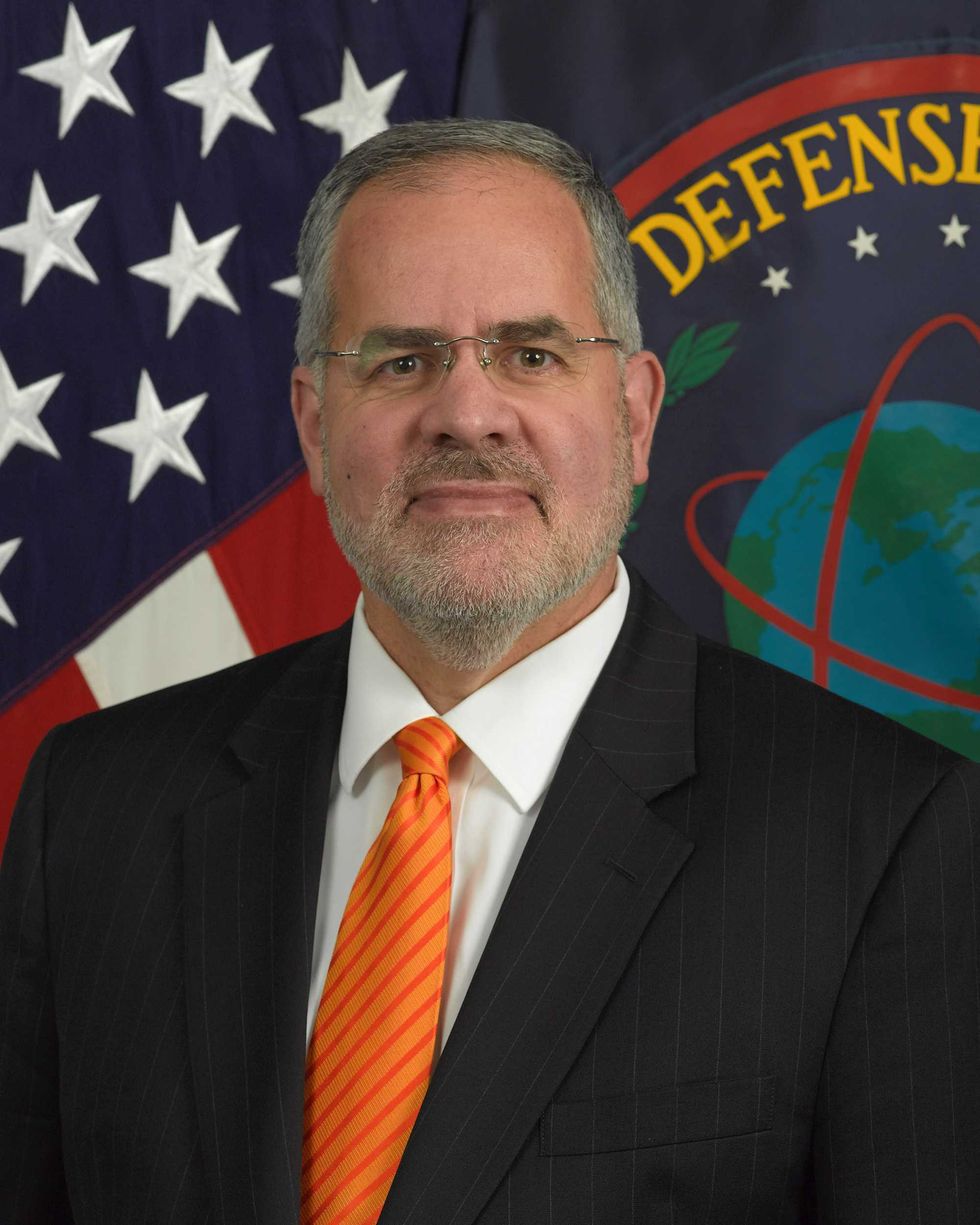 David R. Shedd (provided photo)
David R. Shedd (provided photo)
From nanotechnology to chip manufacturing and artificial intelligence, Shedd said, China succeeded in accomplishing ahead of time eight of 10 objectives under “Made in China 2025,” a 10-year national strategic plan by President Xi Jinping to turn his country into a global technology and manufacturing powerhouse.
China is now the leader in 37 out of 44 emerging critical technologies, according to Shedd and Badger.
“They are on a trajectory to overtake us and have overtaken us already in a number of areas, and that's only going to get worse,” Shedd said.
‘An enormous behemoth’
Shedd and Badger interviewed William Evanina, former director of the U.S. National Counterintelligence and Security Center. He offered insight into the use of LinkedIn by China’s Ministry of State Security (MSS) and People’s Liberation Army (PLA) to contact intelligence targets.
 Andrew Badger (photo provided by David Shedd)
Andrew Badger (photo provided by David Shedd)
“This astounding number — never before reported— showcases Beijing's commitment to mass recruitment that can be best described as a ‘flood the zone’ strategy,” the authors write.
“The MSS doesn't need all its targets to respond. Just a handful can be enough; a single successful recruit can make the entire endeavor worthwhile.”
Examples of LinkedIn outreach might include contacting an academic about writing a research paper or meeting a worker at a coffee shop to discuss their expertise, exchanges possibly unknowingly resulting in intelligence reported back to the MSS, the authors write.
“The MSS is the CIA, the FBI, the National Security Agency, Cyber Command and all other cyber components,” Shedd said.
“It is an enormous behemoth of internal or domestic and international security, and over the … last 13 years, it has become one, if not a premier, service in terms of its capabilities.”
In response to Raw Story’s questions about the use of LinkedIn by the MSS and PLA, Autumn Cobb, a LinkedIn spokesperson, shared links about verification and spotting scams.
‘Threatens lives’
When it comes to China stealing intellectual property from Americans, the stakes are high.
“American military technologies once considered strategic advantages — stealth aircraft, silent propulsion systems, hypersonic missile platforms – are now widely found in the inventories of China’s armed forces,” Shedd and Badger write.
“These thefts are not abstract; they represent the very real threats to the American warfighters who one day may have to face down such advanced technology. The theft of these assets doesn't just threaten markets; it threatens lives.”
Corporations are also threatened.
When Tesla became the first foreign-owned automaker in China, with CEO Elon Musk building a factory in Shanghai from 2019, concerns rose about theft of intellectual property.
 The Great Heist (provided image)
The Great Heist (provided image)
Shedd and Badger quote a former senior Tesla staffer: “Elon always worried about the so-called billion-dollar thumb drive. A single USB stick with the Autopilot source code. That was the nightmare.”
Tesla did not respond to a request for comment.
‘National security at stake’
Since President Donald Trump returned to the White House, Shedd said, an apparent “diminishment” of U.S national security policies on China has been observable, compared to the first Trump administration, which took China more seriously.
Shedd speculated that the shift has to do with China’s control of the majority of rare earth minerals, which are used in magnets manufacturing and technology.
President Xi is definitely watching how Trump has made taking over Greenland a priority, as well as Trump’s decision to “run” Venezuela after capturing President Nicolás Maduro and his wife, Shedd said.
“My fear is the administration has turned it into everything's transactional,” Shedd said.
“Our national security is at stake, and I … fully expect Xi Jinping to move on Taiwan next year.”
Taiwan is a major U.S. trading partner. In December, the Trump administration announced the largest-ever U.S. arms package for Taiwan, valued at $11 billion.
‘Great Heist’
Prior to Trump’s arrival in the White House, Chinese threats to American intelligence and national security were not a priority for the FBI or DIA, Shedd said.
During his tenure at DIA from 2010 to 2015, Shedd said, much of the agency’s focus was on wars in Iraq and Afghanistan, concerns which became “all consuming.”
“There was this almost fear of taking on China operationally, and to really focus in on it was viewed in the FBI counterintelligence as second-rate to Russia,” Shedd said.
“China, I won't say it was a total afterthought, but it certainly wasn't the main focus.”
Shedd and Badger’s book explains how China pulled off its theft of so many American ideas, tracing the effort back to when President Bill Clinton advocated for China to join the World Trade Organization (WTO).
When China joined the WTO in 2001, both Democrats and Republicans had a “naivety” that China would “play by the rules of international trade,” Shedd said.
That set the stage for a flood of Chinese-made, cheaper versions of other country’s products.
“It was framed as diplomacy, as engagement with a potential trading partner, possibly even a future ally,” Shedd and Badger write.
“In hindsight, it was the moment the proverbial virus entered the global trade system and the launching pad for the CCP’s Great Heist against America.”
In 2017, China’s National Intelligence Law legalized espionage, meaning citizens could be required to spy for the CCP.
‘Counter Heist’
To take on China, Shedd said, the U.S. must invest in research and development as well as Science, Technology, Engineering and Mathematics (STEM) education, in which China is "leaping way ahead of us.”
Shedd and Badger also outline a seven-pillar “Counter Heist” strategy to put America on an “active counteroffensive” against China and disrupt the “Chinese espionage apparatus and to reassert America’s place as the world’s innovation superpower.”
If Washington doesn’t get ahead of Beijing’s spying, Shedd said, he fears China will beat the U.S. to a quantum computing breakthrough that will decode all cryptology.
“It will have enormous, dramatic implications for the United States and for the west more generally, and we won't ever have seen it coming,” Shedd said.
The Great Heist is out now'A rage inside of me': Vietnam vet who jabbed Trump joins protests after ICE killing
Ronn Easton was out for lunch in Minneapolis last Thursday when he drove by a federal building now serving as a command center for U.S. Immigration and Customs Enforcement (ICE), one of whose agents shot dead a 37-year-old mother, Renee Nicole Good, in the city on Wednesday.
Easton, 76, said he felt compelled to stop and participate in a protest outside the Bishop Henry Whipple Federal Building in Fort Snelling, Minn. Catching media attention, he ended up interviewed on national TV.
“You could tell by the way I was dressed that I did not intend to go there. I wasn't going to go there protesting in a f—- fur coat. That was not my intent,” Easton told Raw Story.
Yet, Easton said, “I had to. My brain would not settle down.”
On Friday, Easton again felt the urge to respond to “rage” that rose in him after an ICE agent shot Good dead, as she drove her Honda Pilot away from a scene where federal agents had performed an immigration enforcement operation.
Easton dropped flowers at the site where Good was killed by an agent identified as Jonathan Ross, a 10-year ICE veteran.
“I've never done that. Never. But I had to do it this time. For some reason there's something inside of me that's telling me to do this,” Easton said.
“To see people, the hate, the vitriol in this country is really starting to take an effect on me, because never mind that this was a mother that was killed, people are talking about her sexuality.”
Good’s wife said in a statement they were supporting neighbors when the confrontation with ICE took place on a street near their home.
Administration officials have not hesitated to vilify Good.
In a press conference Wednesday, Homeland Security Secretary Kristi Noem accused Good of “stalking and impeding” ICE officers whose vehicles were stuck at the scene due to snow.
Noem also claimed Good “proceeded to weaponize her vehicle, and she attempted to run a law enforcement officer over.”
President Donald Trump used social media to blame Good for her own death.
Vice President JD Vance called the killing of Good “a tragedy of her own making.”
But as media analyses of video of the incident have undercut such readings, so local and state officials have strongly disputed such accounts.
Minnesota Gov. Tim Walz urged people not to “believe this propaganda machine.”
I’ve seen the video.
Don’t believe this propaganda machine.
The state will ensure there is a full, fair, and expeditious investigation to ensure accountability and justice. https://t.co/3faWW4bQvV
— Governor Tim Walz (@GovTimWalz) January 7, 2026
Minneapolis Mayor Jacob Frey called ICE’s characterization of the incident “bull—-.”
‘On a hair trigger’
On Tuesday, ICE said its “largest ever” operation was under way in Minneapolis, with as many as 2,000 agents deployed.
Easton, who lives in Little Canada, Minn., outside Minneapolis-St. Paul, said the ICE crackdown had affected businesses he frequents, including restaurants in St. Paul’s West Side neighborhood.
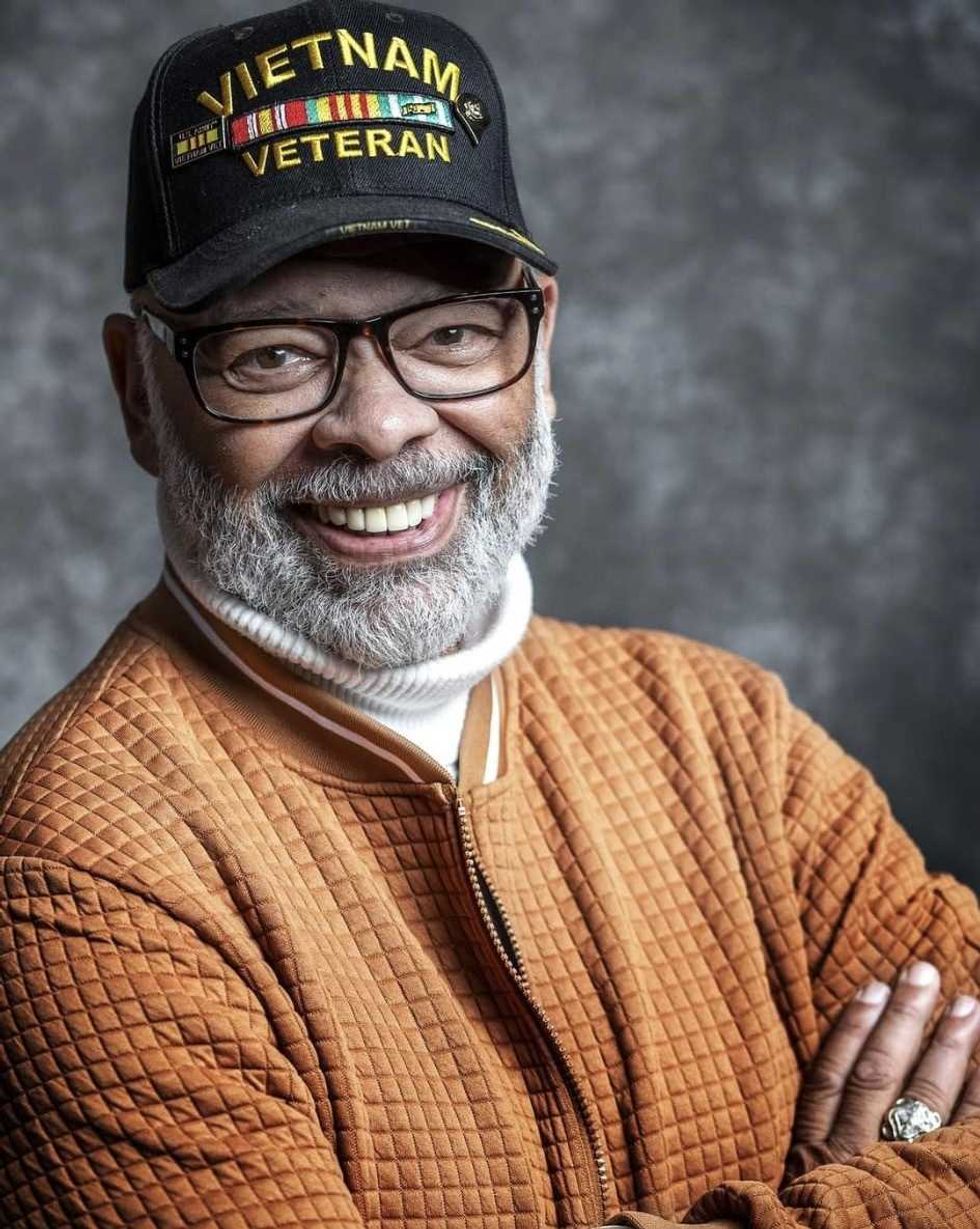 Ronn Easton (provided photo)
Ronn Easton (provided photo)
“There's a rage that is inside of me that I'm trying my damnedest to deal with, seeing people, families torn apart, businesses that I support terrorized by ICE, people that I love affected,” Easton said.
Easton became 100 percent disabled after serving in Vietnam.
Diagnoses of Post-Traumatic Stress Disorder, tinnitus, neuropathy and Type 2 diabetes were linked to exposure to Agent Orange, the cancer- and neurological disease-causing herbicide used to clear enemy hiding spots, Raw Story reported last month.
Raw Story first spoke to Easton about his engagement with Home of the Brave, a nonprofit focused on portraying what it calls “catastrophic harm” caused by the Trump administration.
Easton said ICE deployments near his home made him feel “on a hair trigger.”
“I have been purposefully avoiding confronting ICE or anybody else, for that matter, because I've been struggling,” he said.
“I'm trying to just maintain my sanity and keep a lid on my anger, and it's getting increasingly hard.”
But Easton said ICE targeting “the lowest hanging fruit,” including “mothers and children,” had made him want to speak up even more.
“This is my home,” he said.
“This backbiting bull— and everything that people have died and fought for being stripped away — oh, I can't handle this.”
‘Tension is as high’
Easton said tension on the streets of Minneapolis was “palpable” and “comparable” to that generated in summer 2020, after Derek Chauvin, then a Minneapolis police officer, killed George Floyd, a 46-year-old African American man, an incident that sparked a national racial reckoning amid the Black Lives Matter movement.
Now, Easton said, “The tension is as high, but it's different because then you had a lot of outside agitators coming into town trying to stir up people, and they did.”
Civil unrest following Floyd’s murder included arson and looting. Easton said he encourages peaceful protests, as violence “destroys your message.”
The Trump administration has deployed the National Guard in Democratic cities throughout the country. Easton said it was “trying to induce martial law.
“That is the reason why it is imperative that this be peaceful. No matter what you do, it has to be peaceful, but it has to be hard-hitting.”
Nonetheless, Easton said he expected violence from ICE only to get worse — particularly in light of events in Portland, Oregon on Thursday, where ICE agents shot two people.
“It already has,” Easton said.
Ted Cruz slammed over GOP ‘effort to demonize’ federal judges in time of rising threats
Government watchdogs and legal experts warned that Republicans’ call for the impeachment of two federal judges at a Senate judiciary committee hearing this week upends historical norms and sets a dangerous tone of intimidation.
Led by Sen. Ted Cruz (R-TX), Wednesday’s hearing, Impeachment: Holding Rogue Judges Accountable, was a nearly three-hour partisan battle on the merits of impeaching James “Jeb” Boasberg, chief judge of the U.S. Court for the District of Columbia, and Deborah Boardman, district judge for the U.S. Court of the District of Maryland.
Only 15 federal judges have ever been impeached by the House of Representatives, and only eight removed by the Senate.
Nonetheless, Republicans claim Boasberg is biased against President Donald Trump and his administration and accused Boardman of letting a defendant’s gender identity factor influence what they say is a lenient sentencing of an attempted assassin of conservative Supreme Court Justice Brett Kavanaugh.
“The whole idea that we have a bunch of rogue judges out there just strikes me as not worthy of credence,” said Jonathan L. Entin, a professor emeritus of law at Case Western Reserve University.
“It's a slogan. It's something you put on social media for your 15 minutes or 15 seconds of fame.”
Jay Young, senior policy director for civil rights and civil liberties at Common Cause, a nonpartisan government reform group, said Cruz’s hearing was “an effort to demonize” the judges and “prove a political point.”
“This effort to mischaracterize opinions that you don't believe, you don't agree with, it just feels so dangerous right now,” Young said.
In a June 2024 National Judicial College survey, more than half of judges reported threats to their safety.
“The whole reason why impeaching judges for their rulings, specifically, hasn't been done is to prevent intimidation,” said David Janovsky, acting director of The Constitution Project at the Project On Government Oversight, an independent watchdog.
“This is certainly a moment where there are plenty of threats to judicial independence and integrity, and so crossing a line that hasn't been crossed to go after judges in this moment seems misguided.”
Some judges who have ruled against Trump reported intimidation and doxxing.
“The idea that supposedly responsible federal officials are talking about impeaching judges, for which there's no justification and no real prospect, can't improve the situation,” Entin said.
“If you're a federal judge, and you see something like this, your hair is going to stand on end. This is not appropriate behavior. It's not responsible behavior.”
‘Railing against judges’
Going back to Marbury v. Madison, the 1803 landmark U.S. Supreme Court case which instituted the principle of judicial review, there has been a “well-established tradition in the United States that you don't impeach judges because they make rulings with which you disagree,” Entin said.
“You don't run them off the bench.”
Even the attorney for Anthony Burns, a fugitive slave whose 1854 trial led to outrage when a judge sent him back to slavery, was “the strongest opponent of removing the judge,” Entin said.
“There is a history of people railing against judges saying that ‘They're wrong. They're either tools of the establishment making rulings that oppress workers and consumers, or maybe they’re wild-eyed radicals who are trying to subvert the rule of law,’” Entin said.
“The standard can't be, ‘I'm mad because I lost, therefore this judge is corrupt or incompetent and should be removed from office.’”
‘Wrong-headed’
The Trump administration has railed against Boasberg for decisions including his order in early 2025 to halt deportation flights headed to El Salvador under the Alien Enemies Act — an order that was defied, presenting probable grounds to hold officials in criminal contempt.
“All of this looks very much like a MAGA-coordinated strategy to bring pressure and threats to bear on a federal judge,” said Sen. Sheldon Whitehouse (D-RI) during Wednesday’s hearing.
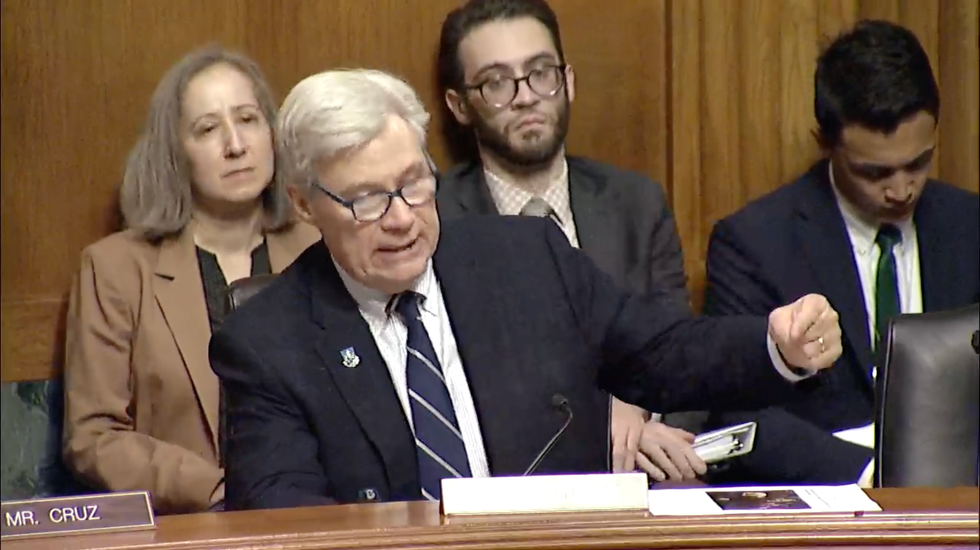 Sen. Sheldon Whitehouse (D-RI) at Wednesday's hearing. Picture: Screengrab
Sen. Sheldon Whitehouse (D-RI) at Wednesday's hearing. Picture: Screengrab
Whitehouse described “an environment in which violent threats are prevalent and in which MAGA DOJ repeatedly refuses to assure us that proper investigative practices are being followed with regard to such threats.
“Presumably, the purpose is to scare Judge Boasberg off or block him from examining contempt of court by MAGA’s Department of Justice.”
Boasberg also presided over several cases related to the Jan. 6, 2021 attack on the U.S. Capitol, when rioters attempted to block certification of President Joe Biden’s victory over Donald Trump in 2020.
During Wednesday’s hearing, Republicans repeatedly pointed to Boasberg’s authorization of non-disclosure requests for telephone toll records related to Special Counsel Jack Smith’s investigation of Trump’s attempts to overturn the 2020 election.
Cruz said: “He knew that Jack Smith was a partisan Democrat engaged in an effort to go after Donald Trump, that he was subpoenaing over 400 Republicans, so the one thing he knew is all of these targets were Republicans.
“The only conceivable basis for Judge Boasberg signing these orders one after the other, is an animus that says every Republican on Planet Earth, every American who voted for Donald Trump, there is reasonable basis to believe they are criminals.”
Whitehouse pushed back on Cruz’s comparison of Boasberg to “a partisan hack” as grounds for impeachment.
“MAGA faults Chief Judge Boasberg because it was Republican senators whose records came up, but that's investigation 101,” Whitehouse said during the hearing.
“People under investigation had called senators. That's why senators’ toll records came up in the investigation. As Jack Smith testified, he did not choose those members. President Trump did.”
When Whitehouse suggested Boasberg approved the telephone subpoenas due to “foreseeable misconduct by Donald Trump and his co-conspirators,” Cruz chalked up the argument to “a longer version of ‘orange man bad.’”
Entin said: “The whole rationale behind this, that you have to impeach judges who make controversial rules, is just wrong-headed. It fundamentally undermines the rule of law.
“Some judges are good, some judges are bad, but we have never, that I know of, impeached federal judges for their rulings.”
‘Quixotic quest’
In the case of Boardman, the Maryland district judge, the DOJ is appealing her eight-year prison sentence for Sophie Roske, charged as Nicholas John Roske, for attempting to assassinate Kavanaugh.
The DOJ sought a sentence of 30 years to life. Throughout the hearing, Cruz emphasized that Roske is transgender and called Boardman’s sentencing “a gross dereliction of duty.”
“It's pretty rich for conservatives to be complaining that the person who stalked Justice Kavanaugh got only eight years for that when President Trump has pardoned 1,500 people who tried to subvert the 2020 presidential election,” Entin said.
Entin said Cruz “should know better” than to push for impeachment of judges on such grounds, given his background as a Harvard Law graduate, Supreme Court clerk and former Solicitor General of Texas
Even in an election year, “it’s wrong for him to pull in stunts like this,” Entin said.
“He knows better than to go off on this kind of quixotic quest.
“Especially he knows better because he knows that it's not just Justice Kavanaugh, by the way, who has faced threats. Some judges have been murdered. Some judges have had family members murdered by people who couldn't get to the judge but could get to the family member.”
Cruz wrote a Jan. 7 letter to House Speaker Mike Johnson (R-LA) encouraging him to advance articles of impeachment against Boasberg and Boardman, but either being removed with a two-thirds Senate vote remains unlikely, Entin said.
“Given a closely divided and highly polarized Senate, it is virtually inconceivable that a judge would actually be removed from the bench because of a controversial ruling,” Entin said.
“It has never happened in our history.”
Jan. 6 author tracks women rioters energized by Trump’s return
On Jan. 6, 2021, author and ethnographer Noelle Cook drove to Washington, D.C. On Capitol Hill, she was shocked to come upon a scene of people smashed against the walls of Congress and emergency responders taking away the body of Ashli Babbitt, the Air Force veteran who was shot dead by police as she attempted to crawl through a broken window and into the Speaker’s Lobby, outside the House chamber.
Cook had not shown up to take part in the “Stop the Steal” rally, which ended in the storming of the U.S. Capitol by rioters who believed Donald Trump’s lie that Joe Biden stole the 2020 election.
As a researcher and amateur photographer, Cook thought the rally might inspire a project.
It did. On Tuesday, the fifth anniversary of January 6, Cook will publish The Conspiracists: Women, Extremism, and the Lure of Belonging, a book focused on the rise of women’s extremism that culminated in the attack on Congress. She also produced a film of the same name.
“I had never done anything MAGA before, so I thought I would just go down and take photographs of the ‘Stop the Steal’ rally because the signs and stuff are always visually interesting,” Cook told Raw Story, of that day now five years gone.
“It was very surreal. It was almost like this sinister carnival, where there was celebratory activity, and also I heard so much violent rhetoric everywhere — people talking about hanging people.”
After Cook returned home to Maryland, she spent three weeks processing images. Then she decided to follow the first 100 women who were arrested for their actions on January 6.
Scouring court records, news reports and social media, Cook looked for patterns.
What she discovered was that many of these women, like herself, had entered middle age.
Cook immersed herself in the stories of two such women, Yvonne St. Cyr and Tammy Butry.
To Cook, the two women embraced “conspirituality,” a term scholars use to describe a quickly growing ideology that blends New Age spirituality, anti-vaccination advocacy, anti-government extremism and conspiracy theories.
A potent mix, it ultimately brought St. Cyr and Butry to the Capitol on January 6.
“I had no intention of studying QAnon or conspiracies or anything, but I kind of followed these women where they led me, which was straight into conspiracies,” Cook said.
‘They get their community online’
St. Cyr and Butry were both in the mob that forced its way into the Capitol.
St. Cyr led a crowd through the tunnels below the main corridors and chambers, coaching rioters in a collective push to open the doors.
Butry, wearing a blue Trump flag as a cape, marched around inside the Capitol, taking selfies and a swig of Jack Daniel’s, Cook writes.
 The Conspiracists (image provided by Broadleaf Books)
The Conspiracists (image provided by Broadleaf Books)
The riot failed to stop certification of the election. Biden became president. St. Cyr would be sentenced to 30 months in prison, Butry to 20 days.
On the page, Cook examines how a combination of personal trauma and isolation during the COVID-19 pandemic made women like St. Cyr and Butry more susceptible to conspiracy theories, as they were exposed to more and more online.
“Most of these women that I talk to, middle-aged women, don't have that much opportunity to socialize anymore, and they get their community online,” Cook said.
During the pandemic, such women found themselves with little time to leave their homes, especially while caring for children or aging parents or both. Turning to Facebook groups and other online communities, they found guidance and community.
“I think conspiracies serve as a coping mechanism for many people,” Cook said.
‘Validated and vindicated’
In interviewing participants in the Jan. 6 riot, Cook said, she has “not talked to anybody personally who regrets that day.”
 Noelle Cook (photo provided by Broadleaf Books)
Noelle Cook (photo provided by Broadleaf Books)
Last January, on his first day back in office, Trump pardoned nearly 1,600 January 6th defendants. That, Cook said, provided a corroboration of many conspiracists’ beliefs.
“It's worse because Trump pardoned all of them, and so they all feel validated and vindicated,” Cook said.
“I keep getting told, ‘See, I told you, this is going to come true.’”
The same goes for Trump’s appointment of Robert F. Kennedy Jr. as Secretary of Health and Human Services. Known before entering office for campaigning against vaccines, Kennedy has used his position to roll back vaccine guidance — actions conspiracists frequently support.
“They're going to celebrate until the kids all start dying of some preventable disease,” Cook said.
Conspiracists continue to look to the Trump administration for what they see as validation of their beliefs, Cook said, particularly adherents of QAnon, the far-right movement whose premise involves Trump waging war on Satan-worshipping cannibalistic pedophiles, among supposed Democratic elites in Hollywood and the federal government.
“It's a wink and a nod all the time, and that keeps people energized,” Cook said.
“For so long as people with authority continue to stoke the fire and continue to throw out the little crumbs here and there to keep people invested, I don't know how it does change, because I feel like everyone was more emboldened and felt a lot more empowered when Trump was reelected this time.”
‘Facts don’t really matter’
Cook did not try to convince St. Cyr or Butry their beliefs were wrong. Rather, she observed and listened.
“That's the problem here with conspiracists, facts don't really matter much,” Cook said. “It’s feelings.
“What you're asking people to do [by asking them to change] is take away their daily purpose, their sense of belonging and their sense of community, which is a really hard thing to do.”
Conspiracists don’t typically change beliefs until it affects them personally, Cook said — as in the case of Erica Roach, a one-time QAnon and anti-vaccine adherent who left Trump’s MAGA movement after January 6, as Raw Story recently reported.
“There's nothing really anyone can do, I don't think, to extract people until they have a reason to see it themselves,” Cook said.
“When you're dealing with such outrageous, outlandish myths and stories and fabrications, it's really hard to convince people otherwise.”
- The Conspiracists is published on Tuesday.
‘I fight’ — and Trump didn’t: Vietnam vet takes aim at president's 'catastrophic harm'
As the U.S. Department of Veterans Affairs (VA) looks to shed as many as 35,000 mostly vacant health-care jobs this month — having already cut nearly 30,000 since President Donald Trump returned to office — a disabled Vietnam veteran has gone public, railing against the administration.
Ronn Easton, 76, is the face of a new video calling out the Trump administration for its attacks on veterans and produced by Home of the Brave, a nonprofit focused on portraying what it calls “catastrophic harm” under Trump.
“This is not what I intended my retirement years to be like,” Easton told Raw Story.
“I've only taken one oath in my life, and there is no expiration date on that oath, and that oath says that I am to defend this country against all enemies, foreign and domestic, and right now, as I have said many, many times, Donald John Trump is the biggest threat to democracy that this country will ever see.
“I'm duty-bound to do whatever I can to fight against it, and I will do that until the day I die.”
‘Veterans' lives at risk’
Last week, Trump announced a $1,776 “veterans dividend” — its value symbolizing the 250th anniversary of the Declaration of Independence and the Revolutionary War against Great Britain.
Analysts pointed out that Trump misrepresented the source of the cash, implying it was raised by tariffs when in fact it was money already approved by Congress for a one-time housing allowance.
In his new video, Easton said Trump’s latest VA moves are “killing soldiers,” particularly as veterans need access to VA health care and suicide hotline resources.
Easton served as an armorer in the Vietnam War, enlisting after two childhood friends were killed in action. He said he has used the Veterans Crisis Line himself.
Following his service, Easton became 100 percent disabled, diagnosed with Post-Traumatic Stress Disorder (PTSD), tinnitus, neuropathy and Type 2 diabetes due to exposure to Agent Orange, the cancer- and neurological disease-causing herbicide used in Vietnam to clear enemy hiding spots.
“There have been times where I have had a gun in my mouth, but I made a promise to my daughter, to my bride, that I would never do something like that,” Easton said.
“That's not an option for me anymore, so that's why I do what I do now. I fight.”
With the Trump administration cutting billions of dollars in medical research funding, including cancer research, veterans end up suffering as many have cancer due to exposure to chemical agents like Agent Orange, Easton said.
“All they're doing is putting veterans’ lives at risk again,” Easton said.
Easton puts a lot of the responsibility on Elon Musk, who led the now-sunset Department of Government Efficiency (DOGE), which took a sledgehammer approach to cutting government funding and employees in the first months of Trump’s second term.
“People like that, who come in and make little of veterans, and they do all of these cuts to the VA, where they fired thousands of people, and all that does is affect the health care [for] people who have served this country,” Easton said.
‘Pattern of callousness’
Easton first got fired up about speaking out against Trump when he watched the then-2016 presidential candidate imply that veterans with PTSD weren’t strong enough, during an address at the United States Military Academy, at West Point.
Trump, 79, has long attracted skepticism and anger among veterans, given his own record of avoiding service during the Vietnam War.
Trump received five draft deferments — four educational and one medical, over a diagnosis of bone spurs in his heels that has been widely questioned.
He famously said avoiding sexually transmitted diseases in Manhattan nightclubs in the 1970s was his “personal Vietnam.”
On entering politics, Trump also courted controversy with attacks on John McCain, the late Republican presidential candidate and Arizona senator who suffered torture as a prisoner of war in Vietnam.
"He's a war hero because he was captured,” Trump famously said of McCain in 2015. “I like people that weren't captured."
Easton said Trump had continued a pattern of “callousness and the lack of caring” toward veterans over the years, including recent controversy over photo opportunities at Arlington National Cemetery.
Easton, a former epidemiologist with the Minnesota Department of Health, started a new podcast this fall focused on current events, where he frequently hosts veterans.
Called Cover Your Six — a military term for “I’ve got your back” — the podcast is the latest of Easton’s efforts to speak out against racism and injustices, which he said he learned from his grandmother, a civil rights activist with the NAACP who hosted figures including late icons John Lewis and Martin Luther King, Jr. in her Memphis living room.
“I've been a warrior all my life,” Easton said.
'Massive corruption': Supreme Court set to boost Trump in case bigger than Dobbs — experts
The Supreme Court is poised to overturn a 90-year-old decision protecting the heads of independent federal agencies from firing by the president — a move more significant in the court’s rightward march than the 2022 decision to overturn the right to abortion in Roe v. Wade, alarmed legal experts tell Raw Story.
“This is the most important case of the decade,” said Seth Chandler, professor at the University of Houston Law Center.
Following oral arguments in Trump v. Slaughter last week, most observers predict the Court will side with President Donald Trump in his firing of Federal Trade Commissioner Rebecca Slaughter.
That will “further unleash massive corruption by this executive branch,” said Lisa Graves, co-founder of Court Accountability and author of Without Precedent: How Chief Justice Roberts and His Accomplices Rewrote the Constitution and Dismantled Our Rights.
‘Even more powerful’
Trump v. Slaughter revisits a 1935 case, Humphrey's Executor v. United States, which concerned President Franklin D. Roosevelt’s firing of an FTC commissioner over disagreements about New Deal policies.
The Supreme Court ruled that Congress could enact laws limiting the president’s ability to fire independent agency officials.
Now, Dec. 8 arguments in front of the current, right-wing-dominated Court made it clear there’s likely no “path for Humphrey's Executor to survive,” Chandler said.
“You're really changing the structure of government and a precept of law on which Congress has relied for 90 years and delegated immense power to these so-called independent agencies, and if these independent agencies are no longer independent, but are basically subject to loyalty tests from the president, that really changes the way that our government functions.”
Harold Krent, professor at the Chicago-Kent College of Law at the Illinois Institute of Technology, agreed that “Humphrey’s Executor is mostly dead.”
“For the most part the idea of an independent-expert-type agency will be over,” Krent said. “It's incredibly significant. It gives the president even more powerful control over these agencies.”
Along with the FTC, agencies likely to be affected are the Securities and Exchange Commission (SEC), the National Labor Relations Board (NLRB), the Occupational Safety and Health Administration (OSHA) and the Federal Energy Regulatory Commission (FERC), Krent said.
“It’s just a wide array of agencies which would almost for sure fall in the wake of the Slaughter case,” he said.
“It just means that there's more of a political edge to all agency investigations and policymaking, and so there is less of a check.”
Chandler said Justice Elena Kagan, a liberal appointed by President Barack Obama, questioned whether “Congress would ever have given so much power to the agencies if it knew that they were going to be subject to the political control of the president.”
“In a post-Humphreys Executor world where Congress felt the people who took leadership positions in these agencies were immune from political firings by the president, they were willing to grant enormous powers to these agencies and basically make them a fourth branch of government,” Chandler said.
“But, now we have half of the deal being taken away. We have that the agencies are now subject to the political desires of the president, but they still have all the power that they did originally.”
‘Out of control’
Legal experts predict that the Court will rule 6-3 in Trump’s favor in Slaughter, along ideological lines.
“I think the majority is going to say Humphrey’s Executor was very dubious when it was enacted and that the agencies look quite different from the way they were conceived,” Chandler said.
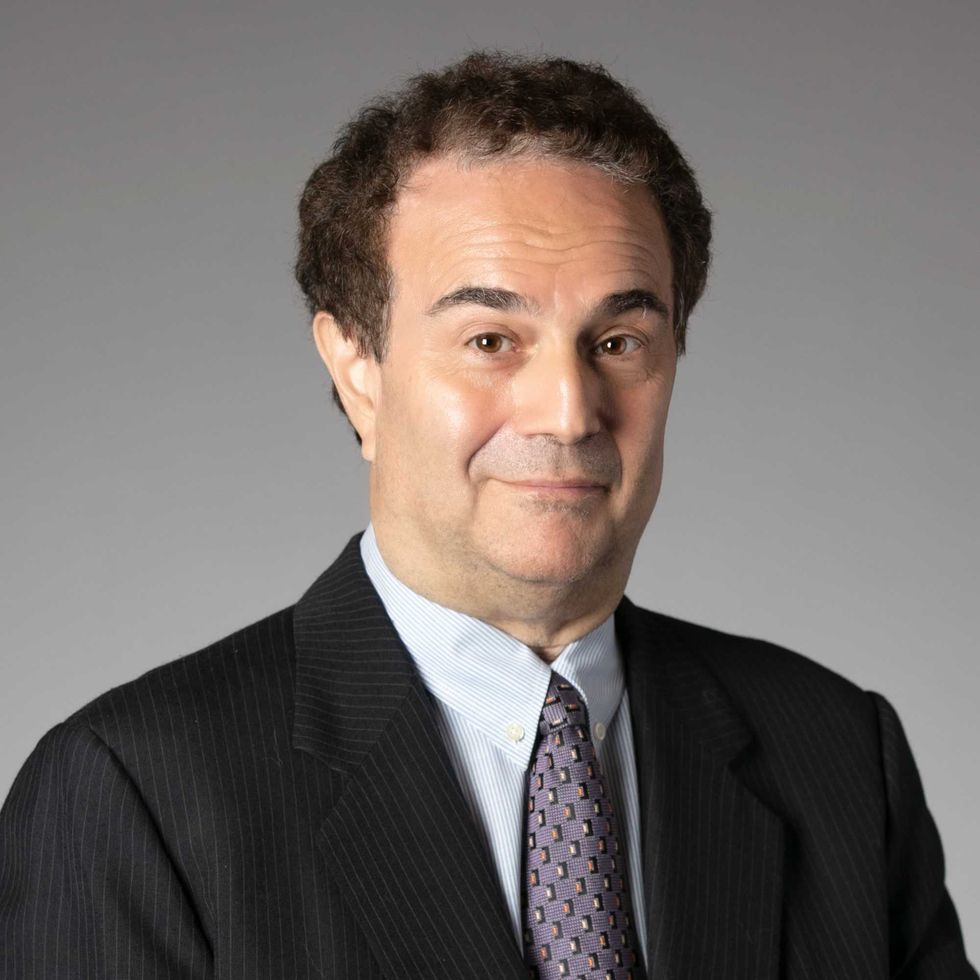 Seth Chandler (Photo credit: University of Houston Law Center)
Seth Chandler (Photo credit: University of Houston Law Center)
The process of weakening Humphrey’s Executor was already in motion, Chandler said, pointing to a 2020 decision, Seila Law LLC v. Consumer Financial Protection Bureau, which allows the president to remove the leader of a single-headed agency at will.
It’s likely the same logic will apply to a multi-person commission, Chandler said.
“I think they're going to say that in some sense the die has already been cast, that Humphrey's Executor has been on life support for a decade, and that it's now time to pull the plug,” Chandler said.
Humphrey’s Executor was an explicit target of Project 2025, the hard-right leadership plan from the Heritage Foundation, Graves said.
Noting that the Court had already “chipped away” at Humphrey’s Executor, Project 2025 said: “The next conservative Administration should formally take the position that Humphrey's Executor violates the Constitution's separation of powers.”
Trump’s claim on the campaign trail that he had no involvement with Project 2025 “misled the American people grossly,” Graves said, adding that the Court has since matched Trump’s “aggression in trying to destroy long-standing rules.”
“That the Supreme Court is playing along with this and actually eagerly embracing it is a sign of how out of control and arrogant the Roberts Court is, because the easiest thing for this Court to do would be to uphold the lower courts that are following those long-standing precedents,” Graves said.
“Instead, it has sought to combine its counter-constitutional edict, giving Donald Trump immunity from criminal prosecution, which swept him back into the White House.
“It's been seeking to combine that ruling, giving Trump extraordinary, unprecedented and unwise powers, with a whole series of rulings through the shadow docket, and now through the primary docket, that further expand presidential power, and I would say so, expand it recklessly.”
‘Loyalty pledges’
After Trump v. Slaughter, Chandler said, he anticipates Trump will seek to extend his firing power to lower-level agency employees, because if the Supreme Court determines “the Constitution vests all executive power in the president, and you take that literally, then it's hard to see why the decision wouldn't extend all the way down the federal bureaucracy.
“President Trump has not been shy about insisting that loyalty to him, personally and to his ideas, is extraordinarily important in government … even with Humphrey's Executor on life support, so I don't see why he would show any restraint once it's killed off,” he said.
“Could he require, essentially, loyalty pledges from mid-level clerks at the NLRB? Why couldn't he insist that they're part of the executive branch and that they are just acting as his delegates, and if they're unwilling to commit to him, why should they have a job?”
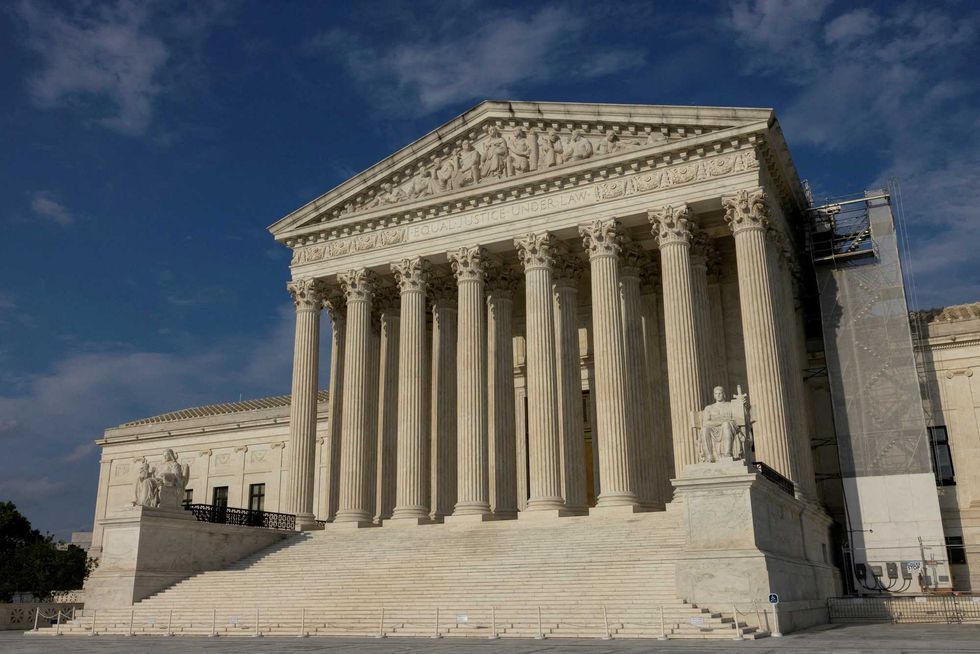 FILE PHOTO: A view of the U.S. Supreme Court in Washington, U.S. June 29, 2024. REUTERS/Kevin Mohatt/File Photo
FILE PHOTO: A view of the U.S. Supreme Court in Washington, U.S. June 29, 2024. REUTERS/Kevin Mohatt/File Photo
Krent agreed.
“The Heritage Foundation, that's what they had recommended in terms of giving the president absolute power over all federal employees, and there is the extreme version of the unitary executive.
“I don't think the Court's going to go there in this particular case, but that's certainly within the goals of the Trump administration, and so it's something the Court may have to face at a future date.”
Graves called giving the president the power to fire independent agency heads at will “a recipe for corruption.”
“The corruption that Trump is engaged in is manifesting on a daily or weekly basis,” she said.
“The idea that the president would be controlling the decisions of the FTC, which relate to an array of matters about corporate conglomeration, as he's basically trying to orchestrate who gets control of a major swath of media, including CNN — it’s extraordinary.”
Warner Bros. Discovery, the parent company of CNN, is preparing to undergo a merger with Netflix or Paramount. Trump has called for selling CNN to new owners.
‘Rampant corruption’
Commissions leading federal agencies typically have split-party representation — which could also disappear following a ruling for Trump in Slaughter, Krent said.
“This whole idea of a balanced independent agency thinking about energy policy or labor policy, banking policy, consumer relations policy, that seems to be done,” Krent said.
That would allow Trump to enact his policies, such as tariffs, as he pleases.
“If he wants to just start changing even tax policy or energy policy or labor policy, he'll be able to do it by saying, ‘This is what I want you to do, or I fire you,’” Krent said.
“It would have all sorts of ramifications across the economy.”
Congress could theoretically limit the power of agencies by defunding them, “but not in reality,” Chandler said.
“It's just something that we took for granted, that you could have, in effect, a fourth branch of government in which immense power had been vested, and when you take that away, and you say it's all subject to the president's control, and you don't undo the prior delegations of power, that is a huge deal,” Chandler said.
A ruling in Trump’s favor will give him “far more power than the founders ever anticipated,” Chandler said.
Krent said overturning Humprey’s Executor “cuts against not only history, but precedence.”
“That could lead to the end of the civil service,” he said.
Graves said: “This would be yet another instance of the Roberts Court handing Donald Trump extraordinary powers that no president should have, and the presidents before him did not.
“This would return, in some ways, the United States to a previous era, which was really disreputable, where civil service appointments … were handed out as a part of a political spoils system, which was rampant with corruption.
“That's why the modern civil service system came to be over 100 years ago, to try to make sure that we would have people serving us at all levels of federal agencies who were well-qualified for those positions and not merely supplicants to the president.”
Krent said overturning Humphrey’ Executor would lead to “increasing politicization of policymaking across the government,” to “the detriment of the American people.”
“It may mean that you're going to have less expertise in government, less political party balance in terms of how these agencies work, and ultimately, that's against the congressional design.
“Regulation and policymaking will just be infused with the president's brand of whatever is politically convenient at the moment.”
'Chilled out of the labor force': watchdog sounds alarm as ICE spreads child care panic
Increased arrests by immigration enforcement agents under the second Trump administration have created a “chilling effect” on the child care industry, resulting in a decrease in workers and in turn less mothers in the workforce, according to a new report from New America, a progressive Washington think tank.
Unveiled on Wednesday, “The Impact of Increased ICE Activity on the Child Care Workforce and Mothers’ Employment,” revealed that 77,000 U.S.-born mothers with children aged 0 to 5 dropped out of the workforce between January 2025 and July 2025 due to “the rise in immigration enforcement,” said Chris Herbst, a report author.
In 2025, mothers’ labor force participation declined by 3 percent, Herbst said.
In an industry where one in five workers are immigrants, there was a decrease of 39,000 foreign-born child care workers during the same time period.
“Because immigration enforcement has made it more difficult for foreign-born workers to do their jobs, their native-born counterparts who depend on their immigrant colleagues have suddenly found that it's more difficult to do their jobs as well,” Herbst said.
While the majority of foreign-born child care workers are in the United States legally, the increase in arrests by U.S. Immigration and Customs Enforcement (ICE) has still created fear for those working in the industry — especially after widespread coverage of ICE detaining a Chicago daycare worker last month.
There’s been a “pretty big” reduction in the number of Hispanic or Mexican U.S.-born individuals in the child care industry as well, Herbst said.
“These are individuals who should not be afraid of ICE,” Herbst said.
“They are not eligible to be deported, and yet they are also leaving the child care sector, and I think for that reason, one of the potential explanations we have is that they've been chilled out of the labor force.”
‘Fear and confusion’
Herbst, a professor at Arizona State University, said the report provides “some of the very first empirical evidence on the labor market consequences of the recent escalation in immigration enforcement.”
“We think the time is right for this kind of report,” Herbst said, as employment figures for child care workers and mothers of preschool-age children are “particularly important in the context of immigration enforcement.”
Researchers used employment data from the Current Population Survey and ICE arrest data from the Deportation Data Project.
“We think that mothers’ employment may be particularly vulnerable to immigration enforcement insofar as it causes disruptions in the child care industry,” Herbst said.
President Donald Trump notably rescinded a directive under former President Joe Biden that protected child care centers, nursery schools and preschools from ICE activity, Herbst said.
The report found that workers in child care centers, rather than private homes, were more likely to have their work affected by immigration enforcement.
“The center-based sector, this is the formal sector. These individuals, as a result, may feel more exposed,” Herbst said.
“Their wages are reported for tax purposes. Child-care centers are often visited unannounced by state child care regulators, and I think the sort of fear and confusion that the ICE has created may have been felt more deeply by those employed in the center-based sector, and they have maybe moved from centers to private households in an attempt to be less visible and feel more protected.”
Herbst said the report’s “estimates may understate the magnitude” of the effects of ICE arrests on child care workers and mothers.
“What I hope this report does is start a conversation about the potential tradeoffs associated with this kind of immigration policy,” Herbst said.
“The administration has talked a lot about the potential benefits. I don't think that we as a country have really started to reckon with the potential downsides of this kind of policy, and I hope what this report does is start a conversation about those downsides.”
With ICE receiving more than $170 billion over four years for increased enforcement activities, Herbst said, “we as researchers need to stay on the case in terms of uncovering what are the potential impacts of all of this new enforcement energy.”
“I would anticipate in the months and years ahead that we will begin to have kind of a full reckoning of the sort of trade-offs associated with this kind of policy.”
Over the coming months, Herbst said he expects the “disruptive effects” of increased immigration enforcement on mothers and child care workers to be “much greater.”
“Even if you look at just sort of the chilling effects alone, I think people are feeling an unprecedented amount of fear and confusion in this new environment.”
‘My MAGA started to crack’: How one Christian nationalist Mormon broke free of Trump
Growing up in an ultraconservative Mormon family, Jennie Gage said, she was primed to become a Christian nationalist and supporter of Donald Trump’s Make America Great Again movement — or MAGA.
But about two years ago, at 49, Gage had a reckoning, realizing she had been “literally a white supremacist from birth,” based on teachings from the Book of Mormon.
Gage said she came to see Mormonism as “the OG Christian nationalist church.”
So, she flipped her life upside down, leaving organized religion and the Republican party.
She now calls herself “a raging feminist,” hosts a podcast, “Life, Take Two,” and is a member of “Leaving MAGA,” a nonprofit online community for former Trump followers who found themselves lost in conspiracies, losing friends, even committing crimes in the president’s name.
‘God’s president’
“I would have never said, ‘I'm white supremacist. I'm Christian nationalist,’” Gage told Raw Story. “I would have just said, ‘I'm traditional, and I'm conservative because I believe in church and family and America.’”
But when Trump ran for president in 2016, Gage embraced MAGA.
“I will never forget him on my big-screen TV, saying the words, ‘Make America Great Again,” Gage said.
“The first time I heard that, I literally started crying … and I pictured Norman Rockwell.”
What came to mind was the painter’s “Freedom from Want” — ”The grandma putting the turkey on the table, the Thanksgiving dinner, the beautiful home and just that American traditional family and conservatism," she said.
 "Freedom from Want" by Norman Rockwell (Wikimedia Commons)
"Freedom from Want" by Norman Rockwell (Wikimedia Commons)
“Obviously, I hated brown people. I hated all the illegal immigrants. I hated that our country was being overrun with lesbians and feminists, women who worked instead of being in their proper place in the home, gay people — they are like the biggest sinners in Mormonism — and baby killers, all of that,” Gage said.
“When [Trump] said, ‘Make America Great Again,’ what I pictured was this businessman not only is going to save our economy, but he's also going to get rid of all of that stuff that people are doing that's destroying our country, and we're going to return to the 1950s where life was great and everything was simple, and he's going to make America great again.”
‘God’s president’
Gage’s family, she said, took Mormonism to “next-level insanity,” as much of her childhood revolved around The Church of Jesus Christ of Latter-day Saints.
“It is a cult without walls,” Gage said.
She attended Brigham Young University, the flagship Mormon college, for two years, taking classes including early childhood development, as well as dating and marriage.
“Even going to Mormon college, I was just indoctrinated also,” Gage said.
As treasurer of the BYU Young Republicans, she canvassed for President George H.W. Bush when he ran against Bill Clinton in 1992.
“It was devastating to see this evil Democrat Bill Clinton get elected,” she said.
As Gage had children, she became less politically involved. Her interest revived when Mitt Romney ran for president.
 Jennie Gage with her children when she said she was still a "Mormon trad wifey" (Photo provided by Jennie Gage)
Jennie Gage with her children when she said she was still a "Mormon trad wifey" (Photo provided by Jennie Gage)
She remembered thinking, “‘We're gonna have a Mormon boy,’ and then that's probably gonna usher in the Millennium, so it's gonna be Mitt Romney and then Jesus.”
Gage began watching Fox News, listening to conservative commentators and reading books by Republican politicians. When Trump announced his run, Gage was familiar with his reality TV show, The Apprentice, and his books, The Art of the Deal and The Art of the Comeback.
“The Apprentice was actually my pipeline into MAGA. It was just really interesting, as we had a business and were really wealthy,” Gage said.
“That sucked me into … completely buying into it because NBC, The Apprentice and his ghost-written books, they showcased him as this really savvy entrepreneur, and that spoke to me because I was this conservative Christian wife of an entrepreneur.”
Gage said she liked the idea of a “businessman” running America, instead of “slimy politicians.”
She became more active on social media and engaged in arguments defending Trump. She recalls one verbal fight with her 10-year-old nephew.
She told him, “Donald Trump to America is going to be what Napoleon was to France. He is going to free us, and generations to come are going to thank God that Donald Trump was voted in office.”
When Trump beat Hillary Clinton in 2016, Gage thought: “President Trump is God's president.”
‘A major shift’
Gage began to upend her life in October 2018. One day at church, she “literally stopped believing.”
“I Googled my own religion for the first time,” she said. “I had never researched Mormonism outside of books that I would go to the Mormon bookstore and read. And so I resigned from the church.”
The church’s history of polygamy pushed her away. Simultaneously, she said, she ended her 24-year marriage, due to infidelity.
She “plunged pretty headlong into Christianity, and in a way, that kind of kept me stuck in that traditional conservative Americana,” she said.
But she continued “deconstructing” her beliefs, and by the time of the 2020 election had seen “a major shift” in her values.
She was prepared to vote for Trump, but on the way to the voting booth, Gage said, “my MAGA started to crack.
“I remember sitting there in the car, and I just felt sick thinking about Donald Trump because some of the debates that year, he started to seem a little bit unhinged, and the MAGA crowd was just no longer aligning with me.”
Gage and her partner decided not to vote for either Trump or Joe Biden.
Gage returned to her computer, to research political issues.
“I’m like ‘Oh s—. There's not one f—- thing that the Republicans are doing that I support. Not one. I'm a Democrat,” Gage said.
“I literally support everything that most of the Democratic leaders are currently doing, and the entire Democratic platform speaks to me so much.”
Gage said she began “really stepping into my true, authentic self.”
While it was “extremely unsettling” and “terrifying” to change her beliefs,” her life in Tucson, Ariz., now looks far different than her life in MAGA.
She has a diverse group of friends, is an atheist feminist, and calls herself an “anarchist” and “white apologist,” for her ancestors’ roles in massacres of Native Americans.
“I am moving farther and farther away from everything that originally made me lean into MAGA,” she said.
‘American Gestapo’
To Gage, Trump is now “f— reprehensible” and “so hateful.”
“Donald Trump is the president of only the people he gives a f— about,” Gage said.
“Everybody else is just out. He's more of a mob boss, and he is a president, and that's not the way that America is supposed to work.”
During the 2024 election, Trump accused Haitians in Springfield, Ohio, of eating cats and dogs. Gage called that the “a straw that broke the camel's back.”
“I wouldn't want him to be in charge of our PTA. I wouldn't vote for him for the president of our homeowners’ association,” Gage said.
“Listening to the debates and the hatred in some of the rallies, I felt like I was having an out-of-body experience, and it made me panic because I'm like, ‘Oh, now what? I hate Donald Trump, and the whole entire MAGA movement no longer aligns with who I am.’”
Gage now calls Trump administration immigration enforcement agents an “American Gestapo.”
Just in cases reported by Raw Story, U.S. Immigration and Customs Enforcement (ICE) has detained a breastfeeding mother, proposed a plan to deport unaccompanied immigrant children, physically assaulted bystanders and deported young adults with pending immigration cases.
“The whole point of the Gestapo was to be this police force out there terrorizing people,” Gage said.
“Sure, deport illegals if they're a threat, but to drag people down the street, the masks, the fear-mongering, the scare tactics, is absolutely reprehensible.”
‘It’s going to re-brand’
Gage is starkly concerned about Trump and the GOP’s quickening push toward Christian nationalism.
“I wasn't just Christian nationalist for logistical reasons,” she said. “It was part of my religion.
“I believed Jesus had written the Constitution and that the American government was just the interim government until Jesus came back, and then Jesus was going to rule America, and the rest of the world from America.
“The Charlie Kirk people … or Christian nationalists, honey, they ain't got nothing on the Mormons. We took Christian nationalism next-level. I believed all of that 100 percent.”
 A college student wearing a “Make America Great Again” cap looks on at a Turning Point USA event, held at University of Florida in Gainesville, Florida on Nov. 13. REUTERS/Octavio Jones
A college student wearing a “Make America Great Again” cap looks on at a Turning Point USA event, held at University of Florida in Gainesville, Florida on Nov. 13. REUTERS/Octavio Jones
Gage likens Christian nationalism to “a virus,” particularly as it gains a platform with Turning Point USA, the youth nonprofit founded by Kirk, who was killed in September.
“My worry is that these religious institutions and these political movements … are targeting the people that they need to target in a way that's effective enough that they are always going to be 10 steps ahead of us, and they're specifically targeting those emerging young adults,” Gage said.
“I'm afraid that conservative Christian nationalism will not die out, that just like a very smart virus, it's going to adapt. It's going to re-brand. It's going to emerge on the other side, maybe a little bit different than the 2020 MAGA movement, but it has a vested interest in protecting itself.
“They have the money, they have the power. They don't want to let that go, so they're going to fight to the death.”
'Terrible experience’: Iraq vet U.S. citizen nabbed by ICE shares ordeal in stark new ad
George Retes, a 26-year-old U.S. citizen and Army veteran, isn’t staying quiet — five months after he says he was assaulted and detained by immigration agents on his commute to work as a security contractor outside Los Angeles.
“Your voice matters,” Retes told Raw Story. “Calling your representatives, calling your people in charge, letting your voice be heard: it matters.”
Retes is the face of a new $250,000 ad campaign from Home of the Brave, a nonprofit focused on portraying what it calls the “catastrophic harm” of President Donald Trump’s second administration.
In the one-minute ad, “The Veteran Who ICE Abducted — and Is Fighting Back,” Retes recounts how he was stopped by a line of “hostile” ICE agents who shattered his car window, pepper sprayed him in the face and threw him to the ground before detaining him over a weekend.
Meant as a direct response to recruitment and self-deportation ads from the Department of Homeland Security, the Home of the Brave ads will air on streaming services where DHS ads have appeared.
“It's important to tell my story now because of everything that's still going on,” Retes said.
“Even though everyone doesn't see it every day, doesn't mean it's not happening.”
Close to 200 U.S. citizens have been detained by ICE since Trump returned to power in January, ProPublica reported.
Retes, who served a tour in Iraq, said DHS has continually called him a “liar.”
In response to an op-ed he wrote for the San Francisco Chronicle, DHS accused Retes via an X post of being violent and refusing to comply with law enforcement, leading to arrest for assault.
As CBP and ICE agents were executing criminal search warrants on July 10 at the marijuana sites in Camarillo, CA, George Retes—a U.S. citizen—became violent and refused to comply with law enforcement. He challenged agents and blocked their route by refusing to move his vehicle… pic.twitter.com/aKS2voKU3j
— Homeland Security (@DHSgov) September 17, 2025
Two weeks later, a DHS press release again claimed Retes was arrested for assault.
Retes said he “100 percent” rejects claims that he was violent and he was never charged with any such crimes during the interaction with immigration agents.
“Something that the current administration is refusing to do is just take accountability,” Retes said
“Lying on my name, lying on people. It's terrible.”
The new ad proves it, he said — by showing footage of his vehicle being swarmed by a line of immigration agents and then him being pinned to the ground.
“I take it with a grain of salt when they come out with these Tweets,” Retes said. “The proof is all there. If now you want to make stories, the court’s right there.”
‘F-----g do your job’
In an extended three-minute version of the video, Retes further explains how he was tear-gassed and how immigration agents zip-tied him and knelt on his back and neck while he was on his way to work security at a state-legal cannabis farm that ICE raided.
Retes is also working with a nonprofit public interest law firm, Institute for Justice, to sue the Trump administration under the Federal Tort Claims Act for the treatment he endured at the hands of federal immigration officers.
“It's all out there, the footage, and they're just imposing their version of reality,” Anya Bidwell, senior attorney at the Institute for Justice, told Raw Story.
While in detention, Retes was put on suicide watch.
But “the most upsetting” part of the ordeal, he said, was that he missed his daughter’s third birthday celebration.
He told Raw Story he slept on a concrete bed in a room with a “tiny window” and lights switched on “24/7.”
He wasn’t allowed a shower, despite his “body essentially being on fire,” Bidwell said.
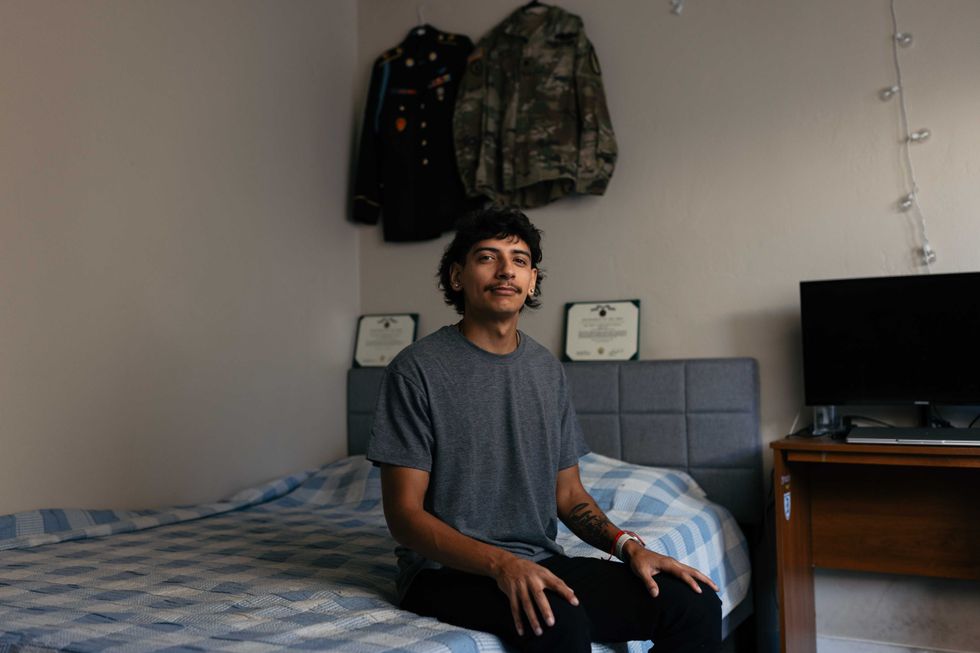 George Retes, a U.S. citizen, says he was detained by ICE on his way to work (Photo provided by Institute for Justice)
George Retes, a U.S. citizen, says he was detained by ICE on his way to work (Photo provided by Institute for Justice)
Retes said he was naked but for a hospital gown and “wasn't able to flush the toilet on my own.”
“It was just an overall terrible experience, and it was something I would never want to relive, and I hope no one ever goes through,” Retes said.
Retes said he was suspended from his job with Securitas, a national security guard contractor, for three weeks following his detention.
“They basically said I had to prove I was innocent before I could go back to work,” Retes said.
The experience left “a bad taste in my mouth,” Retes said, so he quit the Securitas job and is looking for new employment while sharing his story.
Retes said his message to Trump, Homeland Security Secretary Kristi Noem and other government leaders was simple: “F—–g do your job.”
“Make this country better … right now,” Retes said, lamenting “prices going crazy. People are divided. Agents just doing whatever they want, violating rights.”
Holding out hope for Trump to stop “constantly trying to divide the country” is “scary,” Retes said.
But he is still hopeful for “for better days.”
GOP judge eyeing challenge to scandal-hit Texas Dem set to dodge legal pitfall: experts
A Texas judge who announced his candidacy in a high-profile U.S. House race Tuesday isn’t likely to face repercussions despite attracting a complaint filed with the Federal Election Commission , experts told Raw Story.
Tano Tijerina, a Democrat-turned-Republican judge in Webb County, Texas, has long been eyeing a campaign against Rep. Henry Cuellar (D-TX).
Cuellar has held the 28th congressional district seat since 2005, now a prime GOP target in recent redistricting attempts and in light of bribery charges against Cuellar.
On Nov. 21, Cecilia Martinez, an ethics professor from San Antonio, filed an FEC complaint, alleging Tijerina used an exploratory committee to circumvent state resign-to-run laws, which require officeholders to step down from an elected job upon deciding to campaign for another, if there’s more than a year and 30 days left in the term.
Tijerina’s term as a county judge ends Dec. 31, 2026. But, he launched an exploratory committee for a challenge to Cuellar in June, gaining national attention.
Martinez’s allegation that Tijerina violated federal law has also attracted coverage.
She alleges Tijerina made up his mind to run for Congress long before launching his exploratory committee, citing interviews with local TV and radio stations where the judge acknowledged needing to wait until after Dec. 1 to announce a potential candidacy, in order to keep his job.
The complaint also references a social media post, shared by Tijerina, from a Webb County employee who said she was excited to see her “boss” head to Congress.
The FEC says a candidate is considered to be campaigning rather than “testing the waters” if they advertise or make statements as candidates, inform the media of a planned date to announce their candidacy, or raise more money than “reasonably needed to test the waters.”
The complaint says: “Judge Tijerina’s congressional campaign remains under the guise of an exploratory committee not because he is legitimately testing the waters, but because he does not want to face the state-law consequences of declaring his candidacy.”
Tijerina’s exploratory committee called the complaint a “political sham.”
Below is the Tano Tijerina Exploratory Committee's response to the Laredo Morning Times sloppy hit piece:
The Laredo Morning Times has earned itself the Ambush Journalism Award after firing off a press request at 7:51 AM on a Saturday while the entire County government was busy…
— Judge Tano Tijerina (@JudgeTano) November 23, 2025
“Judge Tano Tijerina is following every federal and state rule governing exploratory activity, and has not crossed a single legal line,” said the committee in an X post shared by Tijerina on Nov. 23.
“This is a coordinated smear campaign by far-left operatives terrified that even the possibility of Judge Tijerina exploring a run jeopardizes their grip on TX-28.
“Instead of finding an alternative for their own ethically compromised incumbent, they dug up an ‘online’ professor to rubber-stamp a flimsy accusation that falls apart the moment you read it.”
Bradley A. Smith, a professor at Capital University Law School who served on the FEC from 2000-05, including a year as chair, told Raw Story: “These are very hard cases to try to claim, ‘Oh, no, he's actually a candidate and needs to start filing reports as a candidate.
“You basically are asking the FEC, or eventually a court, to sort of mind read what the person was really planning to do.”
‘They game laws all the time’
Once an individual decides to become a candidate, they are required to register with the FEC within 15 days of raising or spending $5,000.
The Tijerina complaint points out that he is working with a political consultancy, Lilly and Company, and hosted a fundraiser in October, soliciting donations between $500 and $7,000.
But fundraising for an exploratory committee is allowed even if it exceeds $5,000, the FEC says. Only once the individual decides to be a candidate does the $5,000 threshold come into play.
Smith said: “The whole idea is to test the water. You’re telling people, ‘Yeah, I'm thinking about running for Congress. I'm thinking really seriously about it. I'm raising money for it,’ because, remember, you can raise this money, and then if you declare, then the money all has to be reported.”
Activities considered to be testing the waters include polling, traveling and making calls.
“By definition, you are doing campaign stuff, and you can very specifically do things like public polling, see how you might do, and that sort of thing,” Smith said.
“So, it's pretty easy for a candidate in this position, especially once the complaint is filed … to just say, ‘Well, yeah, I'm considering it, there's no doubt about that … that's why I set up an exploratory committee, but I haven't made a final decision.’”
While “all the money he's raising is in accordance with the rules,” Smith said Tijerina could be in “technical violation.”
“Is he gaming the Texas state law? Yeah, probably, but they game laws all the time in this kind of thing,” Smith said.
Randall Erben, an adjunct professor at the University of Texas at Austin School of Law, said it’d be up to a court to determine if Tijerina was a candidate prior to 13 months before the end of his term.
Erben said Texas courts “like eligibility, and they like people staying in office. That’s the public policy of the state.”
However, the framers of the resign-to-run provisions wanted “public office holders to pay attention to what they were doing.
“They were elected to a full term on a county or district office or city office. They wanted them to focus 100 percent on the duties for which they were elected, and not be spending a lot of time seeking other office.
“It's pretty simple public policy, and especially in this day and age where campaigning is 24/7, 365, I think the public policy is probably even more valid now than it was when they added it in the 1950s.”
‘Cost of doing business’
The FEC would not confirm receipt of the Tijerina complaint, due to confidentiality requirements. Any complaint resolutions are published 30 days after a vote to close the matter, said spokesperson Myles Martin.
Smith said: “As a practical matter, I don't think the FEC has ever been very rigorous in trying to say, ‘You've gone too far.’”
With President Donald Trump firing one commissioner and others resigning, the agency has for months lacked a quorum, meaning it “can't act on anything” anyway, Smith said.
“If we think about this for the midterms … it's quite likely that if the fine were assessed [against Tijerina], it wouldn't be until, quite possibly, after the 2026 election.
“A lot of campaigns say, ‘Well, cost of doing business,’ at that point.”
Colorado clerks beg governor: don't give in to Trump over imprisoned election denier
As President Donald Trump exerts pressure to release into federal custody a disgraced Colorado elections official convicted of felonies for a data breach scheme related to attempts to overturn the 2020 election, county clerks in the western state are imploring their governor to keep the convicted felon imprisoned.
Seven Colorado elections officials held a press conference Tuesday to ask Jared Polis, the Democratic governor, to keep former Mesa County Clerk and Recorder Tina Peters in state custody for the duration of her nine-year sentence, for charges related to a data breach that allowed Trump ally Mike Lindell to access voter information in an attempt to prove false claims of election fraud.
Polis has not yet commented on calls for Peters to be released, from rightwing figures including Trump.
“Your silence on this matter is very loud,” one clerk told reporters.
The Colorado election officials expressed fears about safety for themselves and family members, saying they have increasingly endured threats, some made in Peters' name.
"The communications that I received from people who have been confirmed as legitimate threats have explicitly put her name in these communications and have asked me and pleaded me to do the same thing that she has done, and if I don't, then I should be pulled out into the parking lot and tarred and feathered," said Carly Koppes, the Weld County Clerk and Recorder.
Koppes, president-elect of the Colorado County Clerks Association, said that ahead of Thanksgiving she had to plan how to safely visit the grocery store due to threats received since her first term as president of the association, in 2021.
"I had to hide my pregnancy because as soon as my pregnancy was known, my unborn child received disgusting remarks that are just completely unacceptable," Koppes said.
"I've had to have multiple conversations since 2021 with my family, including this weekend, about credible threats."
Koppes added: "This is the reality of the impact that Miss Peters has had, not only just on her own life, but every clerk and recorder's life across the state. The impact is real. The threats are credible."
The Colorado County Clerks Association sent a letter to Polis last Friday, requesting an in-person meeting to discuss why Peters should not be transferred to federal custody.
"We're parents. We are grandparents. We are the people who live next door, who show up to basketball games and potlucks," said Jenny Thomas, Routt County Clerk and Recorder, on Tuesday.
"But, now we price out shatterproof glass for our office windows. We memorize escape routes in every room that we walk into. We don't go places alone, and every single conspiracy theory that spreads online, every lie, every manufactured outrage, it lands on our doorstep."
Thomas continued: "Tina Peters is not a victim. She is a convicted felon ... this is not politics. This is accountability, and either the law means something or it means nothing."
Polis did not respond to Raw Story's request for comment.
'Assault on the rule of law'
Peters was found guilty by a jury in Mesa County, Colorado, of three felony counts of attempting to influence a public servant, one felony count of conspiracy to commit criminal impersonation, one misdemeanor count of official misconduct, one misdemeanor count of violation of duty in elections and one misdemeanor count of failure to comply with the secretary of state.
Since returning to the White House in January, Trump has issued thousands of pardons and acts of clemency, which experts say buck pardoning norms.
Allies of Peters have been pushing for Trump to pardon her, though Trump can only issue pardons for federal charges, not state-level convictions.
Nonetheless, on Sunday Trump posted on Truth Social: "FREE TINA PETERS, WHO SITS IN A COLORADO PRISON, DYING & OLD, FOR ATTEMPTING TO EXPOSE VOTER FRAUD IN THE RIGGED 2O20 PRESIDENTIAL ELECTION!!!"
9News in Denver subsequently reported that a conservative podcaster and Peters ally, Joe Oltmann, called for the execution of Polis, Colorado Secretary of State Jena Griswold and Attorney General Phil Weiser.
NEW: As President Trump increases pressure on Colorado Governor Polis to free Tina Peters, a close ally of Peters is calling for Gov Polis and Attorney General Weiser to be executed.
MAGA podcaster Joe Oltmann called for the execution of several Colorado Democrats by name. pic.twitter.com/BbdgLKpLt5
— Kyle Clark (@KyleClark) November 25, 2025
Trump continues to push the lie that the 2020 election was stolen, despite no evidence that widespread voter fraud occurred. In 2023, Dominion Voting Systems and Fox News reached a nearly $800 million settlement related to lies about voter machine fraud.
Paul López, Denver Clerk and Recorder, said on Tuesday: "Any gesture that panders to Donald Trump's ongoing assault on the rule of law and the integrity of our elections is a betrayal to the thousands of bipartisan elected workers who, despite threats and intimidation, continue to put country before party."
López urged Polis "to uphold the rule of law and protect the security of our elections, not indulge in the whims of a reckless president who continues to betray our republic."
"Our democracy is not a bargaining chip. Again, Governor Polis, I strongly urge you to unequivocally uphold the framework of our Constitution and to protect our election security. We are counting on your solidarity, and your silence on this matter is very loud.”
‘Gut punch’: Jan 6 cop slams Trump as ICE agents echo Capitol mob
First, President Donald Trump issued pardons and other acts of clemency for 1,500 rioters who stormed the U.S. Capitol on Jan. 6, 2021, leaving police officers like Aquilino Gonell bloodied, many with injuries that would end their careers.
Then, rioters started asking for reparations, committing alleged child sex crimes, or leading anti-Muslim protests.
This summer, the Trump administration agreed to bestow military honors on Ashli Babbit, the air force veteran who died while trying to storm the Speaker’s lobby, as “Stop the Steal” protestors attempted to block certification of the 2020 presidential election Joe Biden won.
And in November, U.S. Pardon Attorney Ed Martin said Trump issued another set of sweeping pardons to nearly 80 individuals, including Rudy Giuliani, Sidney Powell and Mark Meadows, who helped Trump “put this scheme together” to overturn the 2020 result, Gonell said.
By contrast, Capitol police officers who served on Jan. 6 have “not even a plaque, no benefits, no awards, no settlements,” Gonell told Raw Story.
“It's more like a gut punch or a stab in the back — you go deeper than the slap in the face. It’s a desecration to the service and sacrifices that the officers like myself bravely did on January 6.”
Gonell spoke at the 2024 Democratic National Convention and wrote a book, “American Shield: The Immigrant Sergeant Who Defended Democracy,” about serving in Iraq and as a police sergeant on Jan. 6.
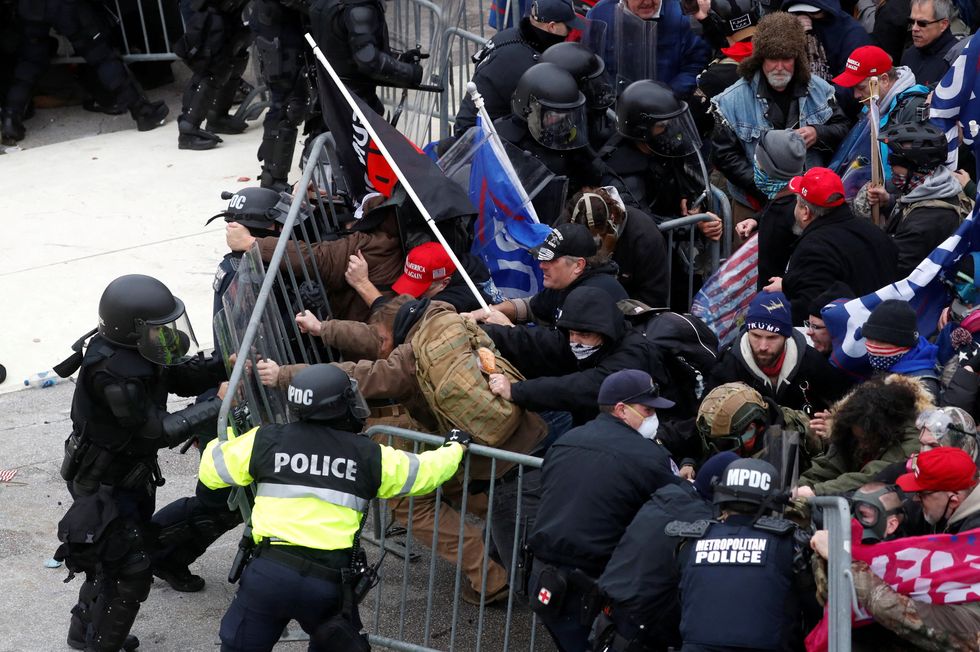 Pro-Trump protesters tear down a barricade on January 6, 2021. REUTERS/Shannon Stapleton
Pro-Trump protesters tear down a barricade on January 6, 2021. REUTERS/Shannon Stapleton
But he told Raw Story that as Trump continues to “whitewash, minimize, downplay, condone or excuse the behavior of a lot of those people who committed the violence,” he has needed to take a step back from such a public role.
“It was my hope that all the actions that I took on January 6 were not in vain, and the people will learn from it, the American people will learn from it, that Congress, those elected officials who I risked my life, they at least thank us for what we did,” Gonell said.
“Republican elected officials, they can't get themselves to do that, because they're going to upset” Trump, he said.
‘Betrayal after betrayal’
Gonell ended up medically retiring after requiring two surgeries for injuries to his foot and shoulder sustained on Jan. 6. He now brings in less than 75 percent of the income he made as a Capitol police officer, he said.
He also suffers from Post-Traumatic Stress Disorder.
Officers who responded on Jan. 6, Gonell said, must “learn how to live with the disabilities or trauma on our own.”
Politicians, he said, “don't give a s— about us, especially those who protected them on Jan. 6 and risked our lives in order to give them a chance to escape, which they did.
“It's a never-ending betrayal after betrayal after betrayal, especially from the Republican-led officials that I risked my life for. That’s one thing that they have been consistent about.”
Republicans have refused to install a plaque honoring Jan. 6 officers despite a mandate to do so being included in a government funding law more than three years ago.
Gonell said the plaque was supposed to be installed in the west tunnel under the U.S. Capitol, where he “almost died,” but Republicans “can’t even get themselves to do that, the bare minimum. But for the members of the mob, they go out in force, in full.”
 Aquilino Gonell in Iraq (provided photo)
Aquilino Gonell in Iraq (provided photo)
Gonell said he had considered voting for Republicans in the past, “but I never got myself to do it.” Now, he said, “each elected official from the Republican Party has turned their back against me and my colleagues. There's no support for January 6 officers.
“They say they do, but each action they take is averse to what they say.”
When Gonell voted in 2024, a woman attempted to give him a Republican sample ballot.
Gonell replied, “‘F— no. His mob and his people tried to kill me in the Capitol when I was working as a police officer in the tunnel.’
“She just bowed her head down and walked back.”
‘Very despicable’
Gonell immigrated to the U.S. from the Dominican Republic at 12. He became a U.S. citizen and said he voted for the first time in 2004, while stationed in Iraq.
Two decades later, the second Trump administration is pursuing aggressive immigration enforcement. Cases reported by Raw Story include the detention and deportation of a breastfeeding mother, and young people with pending immigration cases.
Gonell called such treatment of immigrants “very despicable.”
Agents for U.S. Immigration and Customs Enforcement typically wear masks and full tactical gear without identification. That, Gonell said, “reminds me of January 6.”
Members of far-right groups like the Proud Boys and Oath Keepers showed up at the Capitol in body armor and wielding weapons. Officers fought them for hours.
Gonell said he’s been called a “traitor, un-American” by Trump supporters.
“It’s shameful on their part, but again, I don't expect much from them, given that despite the repeated violations of the Constitution by President Trump … they don't care,” he said.
Gonell wondered for Republicans if “there's a line that they are not willing to cross.”
That could be the release of the FBI files on convicted sex offender Jeffrey Epstein, who was awaiting trial for charges related to sex trafficking of minors when he killed himself in 2019.
A former friend of Epstein, Trump has reversed course on release of the Epstein files. In more than 20,000 emails released by Epstein’s estate, Epstein called Trump the “dog that hasn't barked.”
“I think with a recent revelation about emails and Epstein files, that might break through, but then again, they always come back and try to excuse whatever deficiencies,” Gonell said.
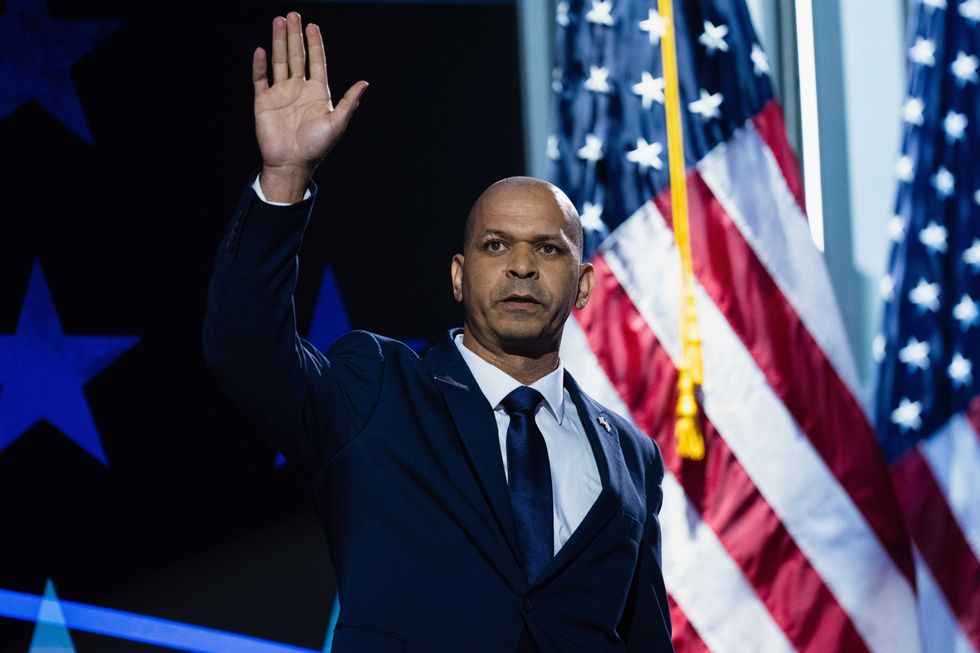 Gonell speaks at the 2024 Democratic National Convention (Tom Williams/CQ Roll Call via AP Images)
Gonell speaks at the 2024 Democratic National Convention (Tom Williams/CQ Roll Call via AP Images)
Gonell recently published an essay for Home of the Brave, a nonprofit amplifying voices speaking out against the Trump administration.
He said he ultimately wonders, “Who's being held accountable for Jan. 6?
“Trump pardoned all those people who assaulted us, who breached and stormed the Capitol, people who maimed us, people who ended our careers, people who traumatized us, people who put in jeopardy the lives of each and every elected official, their staff, reporters and the police officers who were defending the Capitol on January 6.
“I don't even know what to say, just out of words because I'm aghast. It's kind of like, how low can they go?”
'We protect our own': Chicago parents stand up to ICE despite threat of gas and violence
This story has been updated with comments from the Department of Homeland Security, received after publication.
One recent weekday, a group of Chicago kindergartners visited their neighborhood high school. It should have been an unremarkable moment — but as the visit was in motion, parents learned that U.S. Immigration and Customs Enforcement (ICE) agents had been spotted nearby.
Instantly, the community mobilized. Teachers left school and hopped on their bikes. Around 100 volunteer patrollers came out to “protect these kindergarteners … and make sure that they got back safely,” said Lizzie Turner, a parent of a sixth-grader at the Peirce School of International Studies in the Andersonville neighborhood.
“It was very encouraging and very inspiring,” Turner said.
Turner is an administrator of Peirce Pathways, a parent-led support network with more than 100 volunteers currently monitoring neighborhood ICE activity, coordinating parent patrols and working with the school “sanctuary” team to address concerning interactions with agents known to detain parents and teachers, and to have deployed chemical agents near schools.
The group is one of several activated in Chicago since agents descended on the city as part of an aggressive Trump administration immigration enforcement mission, Operation Midway Blitz.
“The resistance movement here has been so successful,” Turner said.
“As much harm as they have been able to get away with, I also think as a city we protect our own … everybody's come together, and everybody's been very selfless in how they've approached it — the collaboration and just willingness to put our own needs aside in the moment to protect our neighbors.”
Jenn Graville Bricker, a second-grade parent, co-founded another parent-led network, Rogers Park School Patrols.
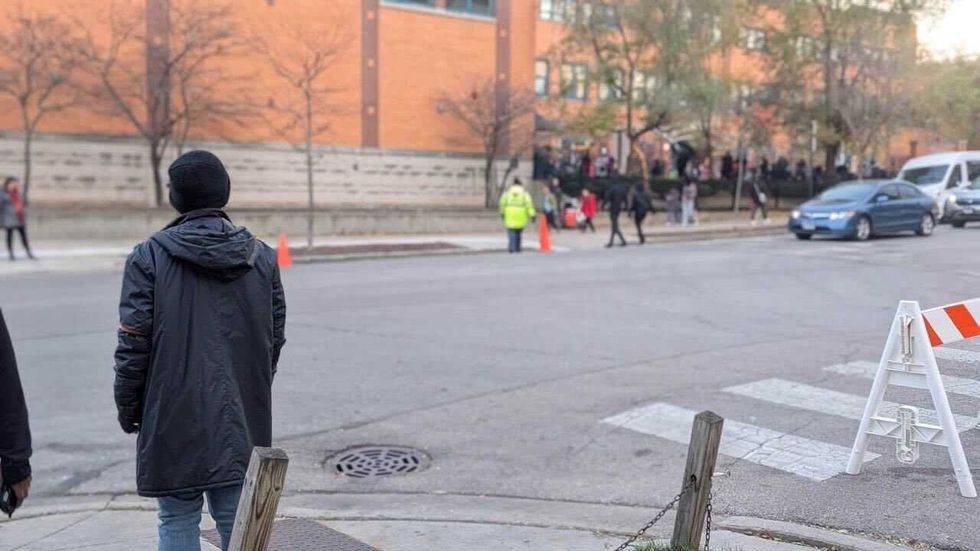 A volunteer with Rogers Park School Patrols watches a school (Photo credit: Meggus Wolf)
A volunteer with Rogers Park School Patrols watches a school (Photo credit: Meggus Wolf)
Part of grassroots neighborhood support organization Protect Rogers Park, the group has nearly a thousand volunteers across 10 schools on the city's north side, Graville Bricker said.
Volunteers wear orange armbands to signal they’re safe people to ask for help. Children have taken note, Graville Bricker said, describing how one child was recently overheard telling her caretaker, “Orange is for whistles, butterflies and safety.”
“Kids are clearly feeling it, and there's a lot of fear,” she said. “It impacts families in really, really deep ways.”
The Department of Homeland Security (DHS) is currently "surging" its law enforcement in Charlotte, N.C., "to ensure Americans are safe and public safety threats are removed.," said DHS Assistant Secretary Tricia McLaughlin via email.
“Americans should be able to live without fear of violent criminal illegal aliens hurting them, their families, or their neighbors," McLaughlin said.
"There have been too many victims of criminal illegal aliens, and President Trump and Secretary Noem will step up to protect Americans when sanctuary politicians won’t."
‘On the fly’
Turner said her group was “building the plane as we fly it” but had come up with a multi-faceted system for monitoring ICE activity and protecting children whose families might be undocumented.
First, a coordinator monitors channels on Signal, an encrypted messaging platform, for reported ICE sightings.
Then the group organizes two volunteers at each of the four corners around a school, during drop-off and pick-up. Mobile patrol teams use bikes or cars.
Local businesses have agreed to be “safe haven sites” for anyone in need of protection from ICE, Turner said.
The community has created other “scrappy” ways to monitor and respond to ICE activity, said Turner, who built a searchable database of license plates confirmed to be ICE vehicles.
“Even just the tooling and technology that we've thrown together on the fly to make it work has been impressive,” said Turner, whose day job is at a software company.
“I hope that other cities don't experience this but if they do, I hope we can be a helpful starting point or model for how to tackle it, and I'm sure other cities will do it better if they build on it.”
‘Collective response to oppression’
Volunteers working with Turner have gone through “ICEWatch” training, which nonprofits and community organizations throughout Chicago have put together to help people know their rights, document when ICE comes into neighborhoods and warn neighbors who might be targets.
Jill Garvey, co-director of anti-authoritarianism nonprofit States at the Core, hosts a weekly ICEWatch training in partnership with Protect Rogers Park.
Gabe Gonzalez, an organizer with Protect Rogers Park, said as many as 6,000 people have been trained — 80 percent from the north side of Chicago and 20 percent watching from around the country.
Gonzalez estimates the group’s reach is as much as 7 percent of Rogers Park, which he said is “enormous.”
“I did community organizing for years, and if you had 1 percent of the neighborhood engaged in what you're doing, you had power, and we're well past that,” he said.
The training has its roots in CopWatch training that originated in the 1960s with the Black Panther Party and is focused on “documenting and responding, not interfering,” Garvey said, adding that the training emphasised “nonviolent protest and dissent.”
Volunteers who respond to an ICE encounter are instructed to send videos and documentation to their local ICEWatch group and an immigrant rights hotline.
Protect Rogers Park’s efforts extend to incorporating other community-based support as a “collective response to oppression,” Gonzalez said.
That includes a knitting club making hats and scarves for patrollers, volunteer appreciation events and arts shows, including one where people get two minutes to vent or perform at a local wine shop. It’s all part of “people coming together to resist,” Gonzalez said.
‘Breaking bodies’
ICEWatch and neighborhood support work comes with risks. Garvey said training focuses on helping people “physically stay safe and to be as prepared as possible for what we would now consider really unusual or aggressive behavior from law enforcement.”
Responders have been detained, tear-gassed, driven off the road while riding bikes and “had guns pointed into their cars,” Garvey said.
Illinois State Senator Graciela Guzmán said she and her staffers are working by 7 a.m. nearly every day, responding to calls from the Northwest Side Rapid Response Team. Ninety schools on Chicago’s Northwest Side have “school watch” teams, Guzmán said.
One Saturday in October, in a residential neighborhood, Guzmán and her staffers were tear-gassed.
“I'm not sure that I'm gonna get the sound of my staffer trying to breathe out of my brain for quite some time,” Guzmán said.
“It's really, really scary when that happens to you. It's scary when you're seeing it happen en masse to community members.”
Guzmán said ICE’s presence has been "overwhelming," the Trump administration "indiscriminate" in who it detains.
Of Guzmán’s constituents, those detained include a daycare worker, a cook, “parents on their way to school with their kids” and a handyman — not to mention U.S. citizens, she said.
“One of the eerie feelings is when you just miss someone getting detained, and you get on site and their car is still on. It's parked, everything is open,” she said.
Andre Vasquez, alderman for Chicago’s 40th Ward, said the Trump administration’s claim of detaining the "worst of the worst" was “bull—t.”
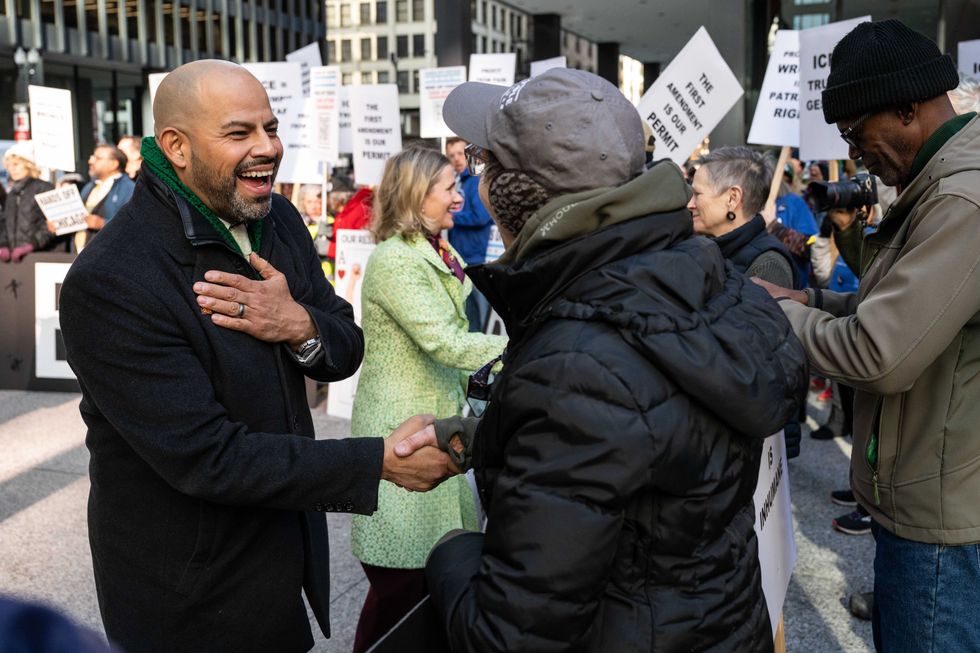 Andre Vasquez at a protest in downtown Chicago (Photo credit: Deana Rutherford)
Andre Vasquez at a protest in downtown Chicago (Photo credit: Deana Rutherford)
Landscapers, single parents, elderly people and churchgoers have also been detained, Vasquez and Garvey said.
“They're breaking bodies. They're breaking doors. They're breaking windows, and they use tear gas as if it's something that should be used every day in our streets, when we know that it should not be,” Guzmán said.
“They're using incredibly violent, heartbreaking tactics.”
ICE and U.S. Customs and Border Protection "are trained to use the minimum amount of force necessary to resolve dangerous situations to prioritize the safety of the public and themselves. Our officers are highly trained in de-escalation tactics and regularly receive ongoing use of force training," McLaughlin said.
"We remind peaceful protestors and members of the media to exercise caution. Being near unlawful activities in the field does come with risks – though our officers take every reasonable precaution to mitigate dangers to those exercising their protected First Amendment rights.
"However, when faced with violence or attempts to impede law enforcement operations, our officers will take legal and necessary steps to ensure their own safety and that of bystanders, up to and including use of force.
One ICE agent “clocked” a young man in the chin as he observed the arrest of a woman in suburban Evanston who crashed her car into an ICE vehicle after it stopped suddenly, Gonzalez said.
Gonzalez said he and other observers were threatened with pepper spray. Agents sat on the young man and one “put his foot by his neck” before handcuffing him, he said.
“The kid was staring at me. His face was just beat up, already starting to swell up, and it was ugly. It was really f—g bad,” Gonzalez said.
Of the incident, McLaughlin said “agents were being aggressively tailgated by a red vehicle. As agents tried to make a U-turn, the red car crashed into Border Patrol.
"A hostile crowd then surrounded agents and their vehicle and began verbally abusing them and spitting on them. One physically assaulted a Border Patrol agent and kicked an agent," McLaughlin said.
"As he was being arrested, he grabbed the agents genitals and squeezed them. As you know this is an extremely painful experience for most human beings and justifies certain responses, the agent delivered several defensive strikes to the agitator to free his genitals from the agitator’s vice."
Vasquez was tear-gassed twice when visiting the ICE facility in Broadview, Ill.
He has organized whistle kit events, “Know Your Rights” business trainings and rapid response efforts with his chief of staff, Cat Sharp, who is running for Cook County commissioner and was one of six Broadview protestors federally indicted for conspiracy to impede or injure federal officers.
“These fascists are looking [at] every possible way to attack people,” Vasquez said.
“If it's not physically on residential streets, it's politically to the court systems, so what we know is, ultimately, justice will prevail.
“These folks don't understand Chicago if they think we're going to tolerate it.”


